英语词性转换
英语单词词性转换
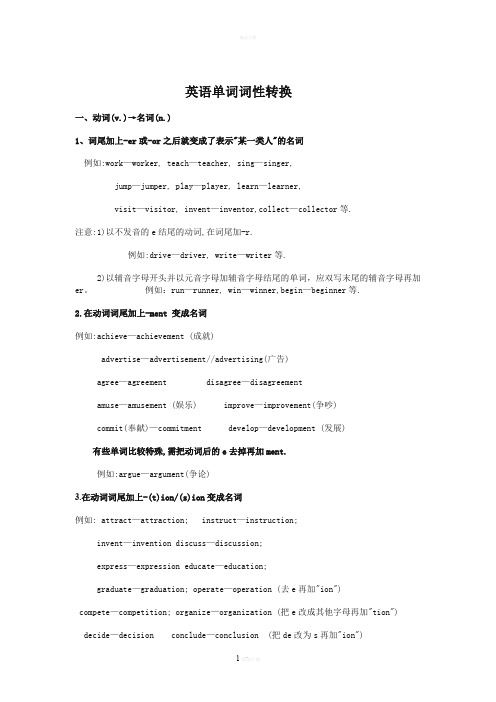
英语单词词性转换一、动词(v.)→名词(n.)1、词尾加上-er或-or之后就变成了表示"某一类人"的名词例如:work—worker, teach—teacher, sing—singer,jump—jumper, play—player, learn—learner,visit—visitor, invent—inventor,collect—collector等.注意:1)以不发音的e结尾的动词,在词尾加-r.例如:drive—driver, write—writer等.2)以辅音字母开头并以元音字母加辅音字母结尾的单词,应双写末尾的辅音字母再加er。
例如:run—runner, win—winner,begin—beginner等.2.在动词词尾加上-ment 变成名词例如:achieve—achievement (成就)advertise—advertisement//advertising(广告)agree—agreement disagree—disagreementamuse—amusement (娱乐) improve—improvement(争吵)commit(奉献)—commitment develop—development (发展)有些单词比较特殊,需把动词后的e去掉再加ment.例如:argue—argument(争论)3.在动词词尾加上-(t)ion/(s)ion变成名词例如: attract—attraction; instruct—instruction;invent—invention discuss—discussion;express—expression educate—education;graduate—graduation; operate—operation (去e再加"ion")compete—competition; organize—organization (把e改成其他字母再加"tion")decide—decision conclude—conclusion (把de改为s再加"ion")describe—description描写,描绘 (这是特例,不规则变化)4.在动词词尾加上-ance变成名词例如: appear—appearance (外貌;出现)perform—performance (演出)accept—acceptance (接受)resist-resistance n.抵抗,阻力5.在动词词尾加-ing变成名词 (方法与动词变为现在分词的方法相同)例如:meet—meeting build—building wait—waitingbathe—bathing say—saying(谚语) mean—meaning注意:以辅音字母开头并以元音字母加辅音字母结尾的单词,应双写末尾的辅音字母再加-ing如:swim—swimming shop—shopping begin—beginning二、动词(v.)→形容词(adj.)1.动词后面加able,以e结尾的动词则去e加able,表示具有此性质,特点或属性.例如: afford-affordable;love-lovable2.动词后面加ed,以e结尾的动词则直接加d,表示被动性的属性或特点.例如: scatter-scattered use-used3不规则的动词则必须记忆,记住其过去分词形式.规律不大,意义同(b).三.名词(n.)→形容词(adj.)1.在名词后面加-y可以变成形容词(尤其是一些与天气有关的名词)例如: rain—rainy, cloud—cloudy, wind—windy, snow—snowy,health—healthy, luck—lucky,anger—angry guilt—guilty(内疚的)tourist—touristy(游客多的) , salt (盐)—salty (咸的)silk(丝绸)—silky(丝绸般的), sleep—sleepy (昏昏欲睡的)注意:1)如果以辅音字母开头并以元音字母加辅音字母结尾,这时应双写辅音字母再加"-y".如: sun—sunny, fun—funny, fog—foggy(有雾的), fur—furry(毛皮的)2)少数以不发音的e结尾的名词变为形容词时,应去掉e再加"-y".如: noise—noisy, ice—icy, shine—shiny(发亮的), taste(口味)—tasty(甜的) 2.名词后面加-ed,以e结尾的直接加d.例如: spot(斑点)—spotted(有斑点的); talent—talented (有天赋的)organize—organized 有组织的; balance—balanced(平衡的)3.一些抽象名词在词尾加-ful可以变为形容词例如:care—careful, thank—thankful, help—helpful,use—useful, meaning—meaningful4.在名词后加-less构成含有否定意义的形容词例如:care—careless(粗心的), use—useless(无用的)hope—hopeless(没希望的),home—homeless(无家可归的)5.一些以-ce结尾的名词,把-ce改为-t变成形容词例如: difference—different, silence—silent, confidence—confident6.在名词后加-ly变为形容词例如: friend—friendly, love—lovely, live---lively7.在名词后加-ous变为形容词例如: danger—dangerous prosperous a 繁荣的(pro 在前+sper 希望+ous)8.名词后面加-al变为形容词例如: music—musical; medicine—medical (这个比较特殊)9名词后面加-able变为形容词,如果以e结尾就去e再加"-able".例如: adjust—adjustable 可调整的 value—valuable有价值的10.名词后面加-en变成形容词例如: wood—wooden 木制的 wool—woolen 羊毛的四.形容词(adj.)→副词(adv.)▲一般在形容词的词尾加-ly可以变成副词例如: quick—quickly, slow—slowly, loud—loudly, sudden—suddenly 等例如:possible—possibly, terrible—terribly欢迎您的下载,资料仅供参考!致力为企业和个人提供合同协议,策划案计划书,学习资料等等打造全网一站式需求。
高中英语词性变化

高中英语词性转换变化及其构词法。
一定程度扩充词汇一 . 转化:指由一种词性转化为另一种词性的构词形式。
1. 名词转化为动词:book (n 书— v 预定);seat (n 座位— v 使就位;落座);water (n 水— v 浇水);shoulder (n 肩膀— v 负责任)2. 动词转化为名词:try (v 尝试— n 尝试);look (v 看— n 表情);swim (v 游泳— n 游泳);dream (v 做梦— n 梦)3. 形容词转化为动词:dirty (adj 脏的— v 弄脏);slow (adj 慢的— v 放慢;减慢);right (adj 正确的— v 纠正);dry (adj 干的— v 变干);free (adj 自由的— v 解放;使自由);wrong (adj 错误的— v 弄错;受委屈)4. 形容词转化为名词:dear (adj 昂贵的— n 喜欢的人/ 物);quiet (adj 寂静的— n 寂静);total (adj 全部的— n 总数)5. 其它词类的转化情况:Our classroom faces south. (south:n 南方;南面— adv 向南;朝南)6. 当英语词汇转化时,转化后的词的读音常有变化。
二 . 合成:指由两个或两个以上本身有独立含义的词合在一起组成一个有具体意义的新词的构词形式。
1. 合成形容词的常见构词形式:⑴数词+ 名词a five - year plan (五年计划);first-class products (一级品);second-hand goods (二手货);a four-word (四字成语)⑵数词+ 名词+ed a three - legged bench (三条腿的登子);a one - eyed camel (一只眼的骆驼)⑶数词+ 名词+ 形容词a 20-year-old lady (一位(一位20 岁的女士);a 1,000-metre-long bridge (一座1000 米长的桥)⑷名词+ 现在分词peace-loving (热爱和平的);meat-eating (食肉的);English-speaking (说英语的);history-making (创造历史的)⑸名词+ 过去分词heart-broken (伤心的);man-made (人造的);state-owned (国有的);water-covered (被水覆盖的)⑹形容词+ 名词+ed absent-minded (漫不经心的);blue-eyed (蓝眼睛的);good-tempered (好脾气的);kind-hearted (和善的)⑺形容词+ 现在分词bad-looking (相貌丑陋的);fine-sounding (动听的);easy-going (容易相处的)⑻形容词+ 名词short-term (短期的);part-time (兼职的);high-class (高级的);large-scale (大规模的)⑼副词+ 现在分词hard-working (努力工作的);far-reaching (深远的);ever-lasting (永恒的)⑽副词+ 过去分词well-developed (高度发达的);well-known (著名的);well-trained (训练有素的)⑾其他构词形式的合成形容词all-round (全面的);face-to-face (面对面的);thank-you (感谢的);out-of-date (过时的)2. 合成名词的常见构成形式:①名词+ 名词silkworm (蚕);footprint (脚印);newspaper (报纸);glasshouse (温室);bedroom (卧室)②名词+ 动名词handwriting (书法);sun-bathing (日光浴);sight-seeing (观光)③形容词+ 名词shorthand (速记);hotline (热线);blackboard (黑板)④动名词+ 名词waiting-room (候车室);sleeping-pill (安眠药);writing-desk (写字台);reading-room (阅览室)⑤动词+ 名词pickpocket (扒手);post office (邮局);playground (操场);break-water (防波堤)⑥动词+ 副词get-together (联欢会);break-through (突破);take-off (起飞);lookout (岗哨)⑦副词+ 动词downfall (垮台);overthrow (推翻);outbreak (爆发);income (收入;所得)⑧其他构成形式的合成名词well-being (福利);good-for-nothing (无用之人);by-product (副产品);touch-me-not (含羞草);self-improvement (自我完善);self-criticism (自我批评)注意:合成词如果出现复数形式时通常在其后加-s 或-es ,如by-products,reading-rooms,但应特别注意:passers-by,lookers-on 等词语是在其表达该词中心含义的词上加-s 或-es . 3. 合成动词及其他合成词类:overthrow (推翻);sleep-walk (梦游);undergo (经历);everything (一切);furthermore (而且);forever (永远);maybe (也许)三.派生:指由一个词根加上前缀和(或)后缀构成另一个词的构词形式。
2024届高考英语复习词性转换汇总(史上最全)清单

高考英语词性转换汇总一、动词变名词1.v+ ment 结尾achieve —— achievement 成就advertise —— advertisement 广告appoint ——appointment 约会委派agree —— agreement 同意arrange——arrangement 安排筹备amuse——amusement 娱乐amaze——amazement 惊奇announce——announcement 宣告argue —— argument 争吵assess ——assessment 评估评价assign ——assignment 任务作业astonish ——astonishment 惊奇attach —— attachment 附件附属物依恋commit —— commitment 承诺,奉献develop —— development 发展disagree —— disagreement 不赞同disappoint —— disappointment 失望depart 启程出发—— department 部门departure 启程出发equip 装备—— equipment 装备,器材embarrass ——embarrassment 尴尬employ —— employment 雇佣enjoy——enjoyment 享受欢乐encourage—— encouragement 鼓励engage —— engagement 订婚从事establish —— establishment 创建excite —— excitement 兴奋激动entertain —— entertainment 娱乐govern 统治—— government 政府improve ——improvement 改进提高invest —— investment 投资judge —— judgment/judgement 判断manage ——management 经营,管理move——movement 运动移动punish —— punishment 惩罚require —— requirement 要求retire —— retirement 退休settle ——settlement 定居解决state —— statement 陈述说明treat —— treatment 治疗对待2.V+ ion 结尾absorb ——absorption 专注act —— action 行动accelerate—— acceleration 加速accumulate—— accumulation 积累adapt —— adaptation 适应改编本addict —— addiction 上瘾入迷add —— addition 增加添加administrate — administration 行政管理admire —— admiration 钦佩佩服admit —— admission 承认adopt —— adoption 采纳收养affect 影响—— affection 喜爱钟爱attract —— attraction 吸引appreciate —— appreciation 欣赏感激apply —— application 申请应用associate —— association 协会联盟联系联想assume —— assumption 假设认为calculate —— calculation 计算civilize —— civilization 文明communicate —— communication 交流compete —— competition 竞争,比赛concentrate —— concentration 集中专心conclude —— conclusion 结论consume —— consumption 消费消耗connect —— connection 连接联系collect —— collection 收藏品作品集celebrate —— celebration 庆祝conclude——conclusion 结论confuse——confusion 困惑congratulate —— congratulation 祝贺consider —— consideration 考虑认为conserve —— conservation 保护保存construct —— construction 建设建造contribute —— contribution 贡献cooperate —— cooperation 合作compare —— comparison 比较** conduct—— conduction 传导connect —— connection 联系correct——correction 改正纠正create —— creation 创造dedicate —— dedication 奉献献身determine —— determination 决心discuss —— discussion 讨论donate —— donation 捐赠decide —— decision 决定declare —— declaration 宣布宣称decorate —— decoration 装饰define —— definition 定义demonstrate — demonstration 演示证明describe —— description描写,描绘digest —— digestion 消化direct —— direction 指导方向disable —— disability 残疾discriminate —— discrimination 歧视distribute —— distribution 分配分布divide——division 分开除(法)edit —— edition 编辑educate —— education 教育elect —— election 选举erupt——eruption 火山爆发estimate —— estimation 估计估算examine —— examination 检查exhibit —— exhibition 展览expand —— expansion 扩大膨胀expect —— expectation 期望期待explode —— explosion 爆炸express ——-expression 词语;表达explain—— explanation 解释explore —— exploration 探索extend ——- extension 伸展延伸extinct(adj)—— extinction 灭绝evaluate —— evaluation 评估评价fascinate——fascination 魅力入迷form ——formation 形成found —— foundation 基础地基generate —— generation 一代人产生hesitate —— hesitation 犹豫graduate —— graduation 毕业illustrate —— illustration阐明,举例说明impress —— impression 印象imagine —— imagination 想象力immigrate——immigration 迁移移居indicate ——indication 指示暗示infect——infection 传染instruct —— instruction用法,说明(多用复数)inspect —— inspection 视察检查intend —— intention 意图打算interact —— interaction 互动interrupt —— interruption 打断中断invent—— invention 发明invite——invitationintroduce ——introduction 介绍inspire——inspiration灵感,鼓舞人心的事invade —— invasion 入侵侵略investigate —— investigation 调查liberate —— liberation 解放limit —— limitation 限制motivate —— motivation 动机occupy —— occupation 职业占据占用object——objection 反对operate —— operation 操作,动手术oppose —— opposition 反对organize ——organization组织participate —— participation 参与permit —— permission 许可允许possess——possession 拥有preserve —— preservation 保护维护produce —— production 生产制造pollute —— pollution 污染predict ——prediction 预言promote —— promotion 促进升职推广pronounce ——pronunciation发音predict——prediction 预测prepare——preparation 准备protect——protection 保护react —— reaction 反应realize —— realization 认识领悟recommend——recommendation 推荐recognize —— recognition 承认认可reflect——reflection 反映反思倒影resolve —— resolution 决心regulate——regulation 规定规章reject——rejection 拒绝relax——relaxation 放松reserve ——reservation 预定satisfy —— satisfaction 满意separate —— separation 分离stimulate —— stimulation 刺激starve ——starvation 挨饿suggest ——suggestion 建议,暗示submit —— submission 提交subscribe —— subscription 订阅solve ——solution 解决方法translate —— translation 翻译transport —— transportation 运输vary —— variation 变化/variety 种类revise ——revision 复习3.V+ ance 结尾assist —— assistance 帮助协助allow —— allowance 允许annoy —— annoyance 恼怒appear —— appearance 外貌,出现enter —— entrance 入口guide ——guidance 指导ignore——ignorance 无知忽略insure ——insurance 保险perform —— performance 演出resist ——resistance 反对抵制rely —— reliance 依赖tolerate ——tolerance 宽容4.V+ ence 结尾exist —— existence 存在insist—— insistence 坚持infer ——inference 推断occur ——occurrence 发生的事prefer —— preference 偏爱喜爱refer ——reference 参考查阅5.V+ ing 结尾begin——beginning 开始build→building 建筑(物)cross→crossing 十字路口end —— ending 结尾,结局engine→engineering 工程feel→feeling 感觉find——finding 发现greet ——greeting 问候hear ——hearing 听力train ——training训练mean —— meaning 意义market→marketing 促销市场营销meet →meeting 会议paint—— painting 绘画say—— saying 谚语suffer ——suffering 痛苦遭遇remind —— reminding提醒bathe ——bathing沐浴travel —— travelling /travelingwarn —— warning 警告bless —— blessing 运气福气6.末尾加-er或-or后变成表示“某一类人”的名词work——worker 工人teach——teacher老师sing——singer 歌手jump——jumper跳高运动员play——player表演者、运动员learn——learner 学习者manage——manager 经理observe——observer 观察者report——reporter 记者wait——waiter 侍者服务员act——actor 男演员administrate ——administrator 管理员行政人员compete——competitor 竞争者conduct——conductor 售票员列车长导体指挥collect—— collector 收集者create—— creator 创造者direct——director 导演经理主任总监edit——editor 编辑educate ——educator 教育者generate——generator 发电机govern ——governor 统治者innovate——innovator 改革者创新者inspect——inspector 视察者巡查员instruct——instructor 教师讲师invent——inventor发明家operate—— operator 操作员接线员sail——sailor 水手survive——survivor 幸存者translate——translator 翻译家visit——visitor访问者7.-age结尾的名词marry—— marriage婚姻store——-storage储存carry—— carriage车厢short——shortage短缺pack——package 包裹use——usage 用法post——postage 邮费8. V+-ure结尾的名词expose——exposure 暴露接触fail—— failure失败press——pressure压力please——pleasure快乐mix——mixture混合物depart—— departure 出发启程sculpt——sculpture 雕塑雕刻品9.动词+y 后缀变名词deliver→delivery 运送discover→discovery 发现recover→recovery 康复;恢复10.V+ 其他beg——beggar 乞丐believe —— belief 信仰behave —— behavior 行为know—— knowledge 知识fly—— flight 飞行serve —— service 服务succeed ——success 成功pursue —— pursuit 追求,从事propose —— proposal 建议withdraw —— withdrawal 取钱;收回;撤退survive —— survival--survivor 幸存者arrive —— arrival到达approve ——approvaldisapprove ——disapproval 不赞成refuse ——refusal 拒绝propose——proposal 建议analyze —— analysis 分析二、形容词变名词1.词尾ent改为ency或enceefficient有效率的——efficiency 效率emergent——emergency 紧急情况urgent——urgency 紧急情况frequent——frequency 频率fluent——fluency 流畅流利patient——patience/impatience 耐性/无耐心dependent——dependence依赖性independent——independence 独立性2.ble结尾,ble改为bilitypossible——possibility 可能responsible——responsibility 责任;职责3.adj+ness结尾的名词crazy——craziness 疯狂eager——eagerness渴望kind——kindness友好happy——happiness幸福lonely——loneliness孤独quiet——quietness安静careless——carelessness粗心helpless——helplessness无助sad —— sadness 伤心nervous——nervousness 紧张tired ——tiredness 劳累mad ——madness 疯狂good——goodness 善良美德4.adj+th结尾的名词warm——warmth温暖true——truth真理dead——death死亡grow——growth成长deep——depth 深度long——length 长度wide——width 宽度strong——strength 力气强度young——youth 青春青年5.以“ity”结尾的高频名词荟萃cruel——cruelty 残忍diverse——diversity 多样性necessary——necessity 必需品;需要secure——security 安全similar——similarity 相似(性)7.其他prosperous——prosperity 繁荣accurate——accuracy 准确性三、名词/动词变形容词1.名词+ydust——dusty 布满灰尘的dirt——dirty 脏的guilt 罪恶——guilty 内疚的greed ——greedy 贪婪fun——funny 滑稽的fur—— furry 毛皮的health——healthy 健康的hair——hairy 毛发多的luck——lucky 幸运的sleep——sleepy 困倦的cloud——cloudy 多云的wind—windy 多风的ice——icy 冰冷的rain——rainy 多雨的salt——salty 咸的sleep——sleepy 困的fog——foggy 多雾的frost——frosty 结霜的mist——misty 多雾的mud——muddy 泥泞的mess——messy 杂乱无章的noise——noisy 嘈杂的shine——shiny 发亮的taste —— tasty 美味的snow——snowy 多雪的smoke——smoky 烟雾弥漫的stone——stony 多石头的storm——stormy 暴风雨的sun—— sunny 阳光灿烂的taste ——tasty 美味的thirst——thirsty 渴的wealth 财富——wealthy 富有的2.结尾,改er为ry hunger——hungry 饥饿的anger —— angry 生气的3.名词/动词+ ed以辅音+辅音结尾的单词,直接加ed talent —— talented 有天赋的offend ——offended 生气的crowd ——crowded 拥挤的heat —— heated 激烈的absorb——absorbed 专心的聚精会神的accustom——accustomed 习惯的bury——buried 专心的learn——learned 博学的skill——skilled 熟练的unit——united 联合的;统一的limit——limited 有限的以元音字母e结尾的单词直接加d complicate——complicated 复杂的balance —— balanced 平衡的organize——organized 有组织的pollute ——polluted 被污染的please ——pleased 高兴的injure——injured 受伤的determine——determined 坚定的;devote——devoted 忠实的experience——experienced 有经验的suppose——supposed 应该的relate——related 相关的元音加辅音结尾的单词,词尾辅音双写再加edspot —— spotted 有斑点的4.名词+ ful/lesscare —— careful/ careless 小心的/ 粗心的help—— helpful / helpless 有帮助的/ 无助的use—— useful/ useless有用的/ 无用的meaning —— meaningful / meaningless有意义的/无意义的colour—— colourful /colourless多彩的/无色的pain 疼痛——painful /painless痛苦的/ 不痛的thank—— thankful / thankless充满感激的/ 不知感恩的peace 和平—— peaceful 和平的play游戏—— playful 爱玩耍的home —— homeless 无家可归的harm —— harmful/harmless 有害的、无害的hope——hopeful 满怀希望的hopeless 不抱希望的forget——forgetful 健忘的beauty——beautiful 漂亮的wonder——wonderful 精彩的power——powerful 强有力的powerless 无力的joy ——joyful 快乐的fear——fearful 害怕的/fearless 无惧的skill——skillful 娴熟的5.名词/动词+ able/iblechange —— changeable 易变的adjust——adjustable 可调整的comfort——comfortable 舒适的knowledge—knowledgeable 知识渊博的suit ——suitable 合适的accept——acceptable 可接受的admire——admirable 令人钦佩的afford——affordable 负担得起的consider——considerable 重要的;相当大的desire——desirable 值得做的;可取的enjoy——enjoyable 令人愉快的favour——favourable 赞成的;有利的forget——forgettable 易被忘记的honour——honourable 可敬的;光荣的reach——reachable 可获得的;可达到的reason——reasonable 合理的rely——reliable 可靠的;可信赖的remark——remarkable 不平凡的understand——understandable 可理解的value——valuable 宝贵的动词以辅音加y结尾把y变i 加able ,deny—— deniable 可否认的rely—— reliable 可靠的access ——accessible 可进入的容易理解的sense——sensible 明智的6.名词+ ous courage——courageous 勇敢的danger—— dangerous 危险的adventure——adventurous 爱冒险的humor/humour——humorous/homourous幽默的mountain——mountainous 多山的poison——poisonous 有毒的religion—— religious 宗教的ambition——ambitious 有抱负的glory ——glorious 光荣的荣耀的advantage——advantageous 有利的以y结尾,改y为i再加ousmystery 神秘—— mysterious 神秘的7.ce 变timportance——important 重要的significance——significant 重要的evidence 证据——evident 明显的patience ——patient 有耐心的silence —— silent 沉默的violence ——violent 暴力的confidence—— confident 自信的convenience——convenient 方便的;便利difference——different 不同的dependence —— dependent 依赖他人的independence—— independent 独立的intelligence ——intelligent 聪明的8.词尾加aladdition—— additional 附加的,额外的agriculture—— agricultural 农业的benefit——beneficial 有益的commerce——commercial 商业的convention——conventional 传统的culture——cultural 文化的education——educational有教育意义的environment——environmental 环境的face——facial 表面的influence——influential 有影响力的music—— musical 音乐的nation—— national 国家的origin起源——original 新颖的;独创的office——official 官方的person——personal (私人的) profession——professional 专业的season——seasonal 季节的;季节性的society——social 社会的tradition——traditional 传统的以元音字母e 结尾的单词,去掉词尾元音加alnature——natural 自然的globe—— global 全球的特例:class—— classical 经典的medicine 药——medical 医学的grammar—— grammatical 语法的9.名词+ ly变形容词friend—— friendly 友好的day ——daily 日常的live——lively 活跃的,有生气的love——lovely 可爱的week——weekly 每周的man——manly 男子气概的;强壮的father —— fatherly 父亲般的10.V+ive 后缀变形容词act——active 积极的attract——attractive 吸引人的cooperate——cooperative 合作的、create---creative有创造力的protect----protective保护的talk--- talkative健谈的instruct--- Instructive有教育意义的effect--- effective有效的impress——impressive 给人印象深刻的relate——relative 相关的sense——sensitive 敏感的11.词尾+ en wood—— wooden 木制的wool—— woolen 羊毛的gold——golden 金色的美好的12.表示方位的词east——eastern west——westernsouth——southern north——northern13.四大洲Asia 亚洲—— Asian Africa 非洲——African Europe欧洲—— European America 美洲——American 14.N +ic 后缀形容词drama——dramatic 戏剧(性)的energy——energetic 精力充沛的enthusiasm→enthusiastic 热情的romance——romantic 浪漫的science——scientific 科学的sympathy——sympathetic 同情的strategy——strategic 战略的其他pride——proud 自豪的fool 傻子——foolish 愚蠢的四、形容词变动词1.词尾加ize modern——modernize 使...现代化social——socialize 使...社会化2.词尾加enfast——fasten 使固定;集中于short—— shorten 缩短wide——widen 放宽*less——lessen 使...减少long——lengthen 使延长strong ——strengthen 加强;巩固bright——brighten 使愉快;使明亮broad——broaden 加宽;拓宽dark——darken 使变暗deep——deepen 加深;使变深fright——frighten (使)惊吓hard——harden 使变硬light——lighten 使变轻loose——loosen (使)变松;放松;松开quick——quicken 加快ripe——ripen 变成熟;使成熟sharp——sharpen 磨快;使锋利soft——soften 使变软weak——weaken 使变弱3.词前加enlarge —— enlarge 扩大;rich——enrich 使丰富使富有sure—— ensure 确保保证able——enable 使能够danger——endanger 使遭遇危险title——entitle给……起题目/命名courage ——encourage 鼓励4 adj+ify结尾的动词simple——simplify 简化beauty——beautify 美化pure——purify 净化identity——identify 鉴定;识别出class——classify 分类五.反义词动词+dis-前缀变否定词approve——disapprove 不赞成agree——disagree 不同意appear——disappear 消失appoint——disappoint 使失望comfort——discomfort 使不舒适cover——discover 发现courage——discourage 使泄气阻碍like——dislike 不喜欢locate——dislocate 重新定位搬迁obey——disobey 不遵守place——displace 取代使离开家园形容词+in-前缀变否定词accurate——inaccurate 不精确的adequate——inadequate 不充分的appropriate——inappropriate 不合适的expensive—inexpensive 不贵的便宜的experienced——inexperienced 经验不足形容词+im-前缀变否定词patient——impatient 不耐心的polite——impolite 没礼貌的possible——impossible 不可能的practical——impractical 不实用的proper——improper 不合适的形容词+un-前缀变否定词able——unable 不能的aware——unaware 不知道的believable——unbelievable 不可相信的certain——uncertain 不确定的clear——unclear 不清楚的comfortable——uncomfortable 不舒服的common——uncommon 不常有的conscious——unconscious 失去知觉的fair——unfair 不公平的forgettable——unforgettable 难忘的fortunate——unfortunate 不幸的fit——unfit 不合适的friendly——unfriendly 不友好的happy——unhappy 不高兴的不幸福的known——unknown 无名的likely——unlikely 不可能的lucky——unlucky 不幸的necessary——unnecessary 不必要的pleasant——unpleasant 不愉快的important——unimportant 不重要的usual——unusual 不寻常的willing——unwilling 不情愿的后缀-less构成的形容词集锦aim——aimless 无目的的care——careless 粗心大意的count——countless 无数的doubt——doubtless 无疑的end——endless 无尽的harm——harmless 无害的help——helpless 无助的home——homeless 无家可归的hope——hopeless 无希望的job——jobless 失业的limit——limitless 无限的rest——restless 不安的use——useless 无用的含mis-前缀的动词集锦mistake 误会misunderstand 误解misuse 误用;滥用mislead 误导mistrust 不信任其他含fore-前缀的单词forecast vt. 预报;预测foresee vt. 预见;预料;预知foreword n. 前言forehead n. 额头forearm n. 前臂forehead n. 额头forearm n. 前臂forecast vt. 预报foresee vt. 预见;预知foreword n. 前言foretell v. 预言;预示“ward”后缀方位词southward 向南northward 向北eastward 向东westward 向西upward 向上backward 向后动词+re-前缀变动词cycle——recycle 再利用;回收利用do —— redo 重做use——reuse 重新使用build——rebuild 重建write——rewrite 重写tell——retell 复述visit——revisit 重新拜访view——review 复习。
英语单词词性转换的基本规律
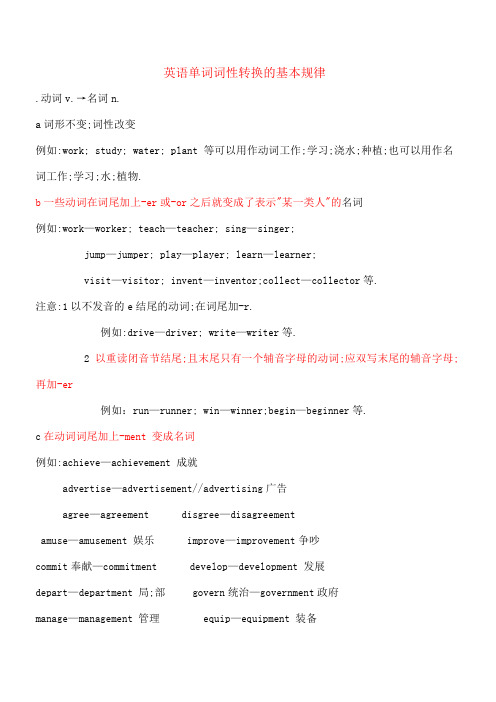
英语单词词性转换的基本规律.动词v.→名词n.a词形不变;词性改变例如:work; study; water; plant等可以用作动词工作;学习;浇水;种植;也可以用作名词工作;学习;水;植物.b一些动词在词尾加上-er或-or之后就变成了表示"某一类人"的名词例如:work—worker; teach—teacher; sing—singer;jump—jumper; play—player; learn—learner;visit—visitor; invent—inventor;collect—collector等.注意:1以不发音的e结尾的动词;在词尾加-r.例如:drive—driver; write—writer等.2以重读闭音节结尾;且末尾只有一个辅音字母的动词;应双写末尾的辅音字母;再加-er例如:run—runner; win—winner;begin—beginner等.c在动词词尾加上-ment 变成名词例如:achieve—achievement 成就advertise—advertisement//advertising广告agree—agreement disgree—disagreementamuse—amusement 娱乐 improve—improvement争吵commit奉献—commitment develop—development 发展depart—department 局;部 govern统治—government政府manage—management 管理 equip—equipment 装备有些单词比较特殊;需把动词后的e去掉再加ment.例如:argue—argument争论d在动词词尾加上-tion/sion变成名词例如: attract—attraction; instruct—instruction;invent—invention discuss—discussion;express—expression educate—education;graduate—graduation; operate—operation 去e再加"ion"compete—competition; organize—organization 把e改成其他字母再加"tion" decide—decision conclude—conclusion 把de改为s再加"ion"describe—description描写;描绘这是特例;不规则变化e在动词词尾加上-ance变成名词例如: appear—appearance 外貌;出现perform—performance 演出accept—acceptance 接受f在动词词尾加-ing变成名词方法与动词变为现在分词的方法相同例如:meet—meeting build—building wait—waiting bathe—bathing say—saying谚语 mean—meaningend —ending train —training wash—washing注意:以重读闭音节结尾;且末尾只有一个辅音字母的动词;应双写末尾的辅音字母;再加-ing如:swim—swimming shop—shopping begin—beginningg其他一些比较特殊的变化例如: Beg乞讨—beggar乞丐 behave行为举止—behaviorknow知道—knowledge知识 fly—flight 飞行heat 加热—heat热量 hit 撞击—hit 轰动一时的人或物;碰撞mix 混合—mixture混合物 press按;压—pressure压力sit坐—seat 座位 succeed—success成功tour—tour旅游/ tourist 游客2.动词v.→形容词adj.a动词后面加able;以e结尾的动词则去e加able;表示具有此性质;特点或属性.例如: afford-affordable;love-lovableb动词后面加ed;以e结尾的动词则直接加d;表示被动性的属性或特点.例如: scatter-scattered use-usedc不规则的动词则必须记忆;记住其过去分词形式.规律不大;意义同b.3.名词n.→形容词adj.a在名词后面加-y可以变成形容词尤其是一些与天气有关的名词例如: rain—rainy; cloud—cloudy; wind—windy; snow—snowy;health—healthy; luck—lucky;anger—angry guilt—guilty内疚的tourist—touristy游客多的 ; salt 盐—salty 咸的silk丝绸—silky丝绸般的; sleep—sleepy 昏昏欲睡的注意:1如果以重读闭音节结尾;且词尾只有一个辅音字母;这时应双写辅音字母再加"-y".如: sun—sunny; fun—funny; fog—foggy有雾的; fur—furry毛皮的2少数以不发音的e结尾的名词变为形容词时;应去掉e再加"-y".如: noise—noisy; ice—icy; shine—shiny发亮的; taste口味—tasty甜的b名词后面加-ed;以e结尾的直接加d.例如: spot斑点—spotted有斑点的; talent—talented 有天赋的organize—organized 有组织的; balance—balanced平衡的c一些抽象名词在词尾加-ful可以变为形容词例如:care—careful; thank—thankful; help—helpful;use—useful; meaning—meaningfuld在名词后加-less构成含有否定意义的形容词例如:care—careless粗心的; use—useless无用的hope—hopeless没希望的;home—homeless无家可归的e一些以-ce结尾的名词;把-ce改为-t变成形容词例如: difference—different; silence—silent; confidence—confidentf.在名词后加-ly变为形容词例如: friend—friendly; love—lovely; live---livelyg.在名词后加-ous变为形容词例如: danger—dangeroush名词后面加-al变为形容词例如: music—musical; medicine—medical 这个比较特殊i名词后面加-able变为形容词;如果以e结尾就去e再加"-able".例如: adjust—adjustable 可调整的 value—valuable有价值的j名词后面加-en变成形容词例如: wood—wooden 木制的 wool—woolen 羊毛的k一些表示国家的名词可以在词尾加-ese; -ish或-n构成表示国籍;语言的形容词例如:China—Chinese; Japan—Japanese; England—English;America—American; India—Indian; Australia —Australian 注意Canada—Canadian4..形容词adj.→副词adv.▲一般在形容词的词尾加-ly可以变成副词例如: quick—quickly; slow—slowly; loud—loudly; sudden—suddenly 等但是;以下几点值得注意:a 一些以"辅音字母+y"结尾的形容词;要把y改为i再加-ly例如: happy—happily; angry—angrily; lucky—luckily; heavy—heavily; noisy—noisilyb 有些以-ble或-le结尾的形容词;去掉e加-y例如:possible—possibly; terrible—terriblyc少数以e结尾的形容词;要去掉e再加-ly例如: true—truly但绝大多数以e结尾的形容词仍然直接加-ly 例如: polite—politely; wide—widely d以-l结尾的形容词变为副词时要在词尾加-ly;以-ll结尾的才在词尾只加-y.例如: usual—usually; careful—carefully; useful—usefullyfull—fully 以-ll结尾的才只加yOK;以上就是英语单词词性变化的一般规律;希望对大家有所帮助PS:有些同学可能对元音辅音以及重读闭音节不是很了解;那我在这里再做下补充说明. 1.英语26个字母中;a e i o u是元音字母; y是半元音字母; 其余都是辅音字母.★所谓半元音就是有时候做元音;有时候做辅音.半元音字母y做元音有: shy;sky做辅音比如最简单的:yes2.开音节和闭音节开音节分两种:绝对开音节和相对开音节绝对开音节指的是"元音字母结尾"的音节例如 we; hi等相对开音节是指"辅音字母-元音字母-辅音字母-不发音的e"的音节;r除外. 例如;take;make等比如:take 在这个单词中;t是辅音;a是元音;k是辅音;e是不发音的元音◆在开音节中; 元音字母发他们在字母表中的音闭音节; 则是指"辅音字母-元音字母-辅音字母"的音节 -al等除外例如:leg;cross 等◆在闭音节中;元音字母发不同的音a e i o u例 sat let sit not nut 试着读下这些单词;这些单词中;元音发的音都不是它们在字母表中发的音2.英语重读闭音节就是以辅音因素结尾的;而且是重读音节的音节.比如apple 划音节就因该是ap/ple 前面那个ap是一个音节;这个音节以辅音因素p结尾;所以就是闭音节.仅仅能看出是闭音节;是不是重读闭音节还要看这个音节是不是重读的重读闭音节三要素:1. 必须是重读音节;2. 最后只有一个辅音字母;3.元音字母发短元音说通俗点;打个比方; /u/是短元音;/u:/是长元音重读闭音节即两个辅音中间夹一个元音.如:sit---sitting begin---beginning重读在gin这个音节上●像travel这个单词;"vel"也是"辅音+元音+辅音"的结构;但是重音不在vel这个音节上;所以不用双写"l";可以为travelled;也可以是traveled;更常用的是后者.。
(完整版)英语词性转换归纳

英语词性转换归纳动词变名词1.v+ ment 结尾achieve---achievement 成就advertise--- advertisement// advertisingagree— (in )agreementapartment 公寓amusement 娱乐argue---argument争吵commit奉献—commitmentcompliment 称赞,恭维develop---developmentdisgree—disagreementdepartment 局,部experiment 实验,试验equip 装备---equipment 装备,器材govern 统治—government 政府manage---management 经营管理2.V+ tion 结尾attract吸引—attraction 有吸引力的事或人;令人向往的地方conclude—conclusion 结论compete—competition 竞争,比赛discuss—discussion 讨论educate-----educationdecide----decisiondescribe—description描写,描绘express 表达----expression 词语;表达方式graduate 毕业—graduationoperate 操作,动手术—operationorganize----organizationinstruct—instruction 指导,介绍invent—inventor / inventioninvite—invitationinspire---inspiration 灵感,鼓舞人心的---pollute----pollution 污染predict---prediction 预言pronounce ---pronunciationresolve 决心-----resolution 决心permit 允许-----permissionsuggest-建议,暗示--suggestionsolve解决-----solution 解决方法3.V+ ance 结尾appear—appearance 外貌,出现perform----performance 演出4.V+ ing 结尾bathe 洗澡---bathingend 结束----ending 结尾,结局train 训练---trainingmean ---- meaning 意义say-----saying 谚语5.V+ 其他Beg(乞讨)—beggar 乞丐behave 行为,举止----behaviorknow---knowledgefly—flight 飞行heat 加热---heat 热量hit 撞击------hit 轰动一时的人或物,碰撞mix 混合-----mixture 混合物press 按,压—pressure 压力sit-----seat 座位succeed-- successtour 在-----旅游,在-----作巡回演出直接+地点 tour China ---tour 旅游/ tourist 游客名词变形容词1名词+yAnger 生气-----angryhunger---hungryfog—foggy有雾的fur----furry 毛皮的guilt 罪恶---guilty 内疚的health---healthyluck---luckycloud---cloudywind—windyrain---rainysnow---snowysun—sunnytourist------touristy 游客多的business---busysalt 盐--- salty 咸的shine---shiny 发亮的silk 丝绸—silky 丝绸般的sleep---sleepy 昏昏欲睡的taste 口味,品味------tasty 甜的2.名词+ edbalance –balanced 平衡的spot 斑点,地点----spotted 有斑点的talent-----talented 有天赋的organized 有组织的distusted 厌恶的offended 生气的crowded 拥挤的polluted 被污染的pleased 高兴的3.名词+ ful/lessmeaning—meaningful 有意义的care—careful/ careless 小心的;粗心的help---helpful / helpless home—homeless 无家可归的colour---colourfulpain 疼痛---painful 痛苦的use---useless/ usefulthank—thankful 充满感激的peace 和平 ---- peaceful 平静的,宁静的playful 顽皮的,爱玩耍的4.名词+ ableadjustable 可调整的comfort---comfortableknowledge---knowledgeablesuit 一套-----suitable 合适的5.名词+ ousenormous 巨大的danger—dangerousmystery 神秘-----mysterious 神秘的6.ce 变 tconfidence----confidentdifference---different7. al 结尾medicine 药----medical 医学的music---musicalnature---natural 自然的person---personal (私人的) nation—national 国家的education---educational有教育意义的tradition----traditional 传统的origin起源---original 新颖的;独创的8.名词+ lyfriend—friendlylive---lively 活跃的,有生气的love—lovely 可爱的9.+ en 结尾wood—wooden 木制的wool—woolen 羊毛的10. 其他energy精力---energeticfool 傻子—foolish 愚蠢的freedom 自由—free 空的,免费的height 高度—highillness 疾病--- illlove—loving 慈爱的death---deadpleasure---pleasant / pleased popularity 流行性—popularpride---proudscientist----scientific 科学的方位的词表达名词—形容词East—easternWest—westernSouth—southernNorth---northernIn the west of ChinaIn the western part of China四大洲名词-----形容词Asia 亚洲–---- AsianAfrica 非洲----- AfricanEurope欧洲----- EuropeanAmerica 美洲-----American形容词变副词1.形容词+ lybad—badlybright—brightly 明亮地casual—casually 随意地clear—clearly 清楚地complete—completely 完全correct---correctly 正确地final--finallyfortunate—fortunately幸运地general—generally 一般来讲loud—loudlyparticular 特殊的,独特的—particularly polite—politelyproper 合适的-,恰当的---properlymain------mainly 主要地most 多数-----mostly 多半,大多数normal---normally 正常地quick—quicklyquiet—quietly 轻轻地,安静地real—reallyrecent 最近的----recently 最近;近来hard 难的;努力地---hardly 几乎不late 迟的—lately 最近;近来sad--sadlyslow---slowlyspecial—specially 专门,特殊地specific---specifically 特定地,明确地strong—strongly 坚决地,强烈地sudden—suddenly突然usual—usually2. 以le 结尾的去e + ycomfortable---comfortablygentle—gentlypossible---possiblysimple ----simply 仅仅;只;简单地terrible---terribly3. 辅音字母+ y 变 ilyeasy—easilyheavy—heavilyhappy--happily4.特殊good—well好地 well 身体健康的,井true—truly名词---形容词—副词beauty 美,美人—beautiful—beautifully care—careful—carefully care—careless—carelesslydifference---different---differently happiness—happy—happily hunger—hungry--hungrily health—healthy—healthily luck—lucky—luckily noise—noisy—noisily pride—proud—proudly骄傲地sadness—sad—sadlysafety 安全;安全的地方—safe—safely silence—silent---silently 默默地success—successful—successfully truth—true—truly unluck—unlucky—unluckilywonder 奇迹—wonderful—wonderfully既是形容词又是副词early get up early ;an early trainlate be late for classcome late for schooldeep dive deep into the seaa hole deep largehigh jump high;a high mountainhard a hard question;a hard stone work hard / study hardrain hardlong It takes too longIt takes a long timefar jump farMy home is far from school straight a straight linego straight along here(1)v.-n.动词转化为名词,post-postage mail-mailweigh-weight advise-advice(2)v.-n.-a.动词转化成名词-形容词act-actor / actress-activechange-change-changeable(3) v.-a.-ad.-n.动词转化成形容词,副词,名词fill-fullneed-necessary-necessarilyinterest(v. / n.) interested /interesting (4)n. a. n. a.名词转化为形容词person personal ( 个人的; 私人的)fun funny(5)n. pl. n. pl.名词转化为名词复数gentleman gentlemen human humans(6)a. ad. a. ad.形容词转化为副词possible possibly probable probably(7)a. ad. n.形容词转化为副词,名词true truly truthlucky luckily luck(8)原级比较级最高级far farther / further farthest / furthestlittle less least一、名词变为形容词的方法1. 在名词后面加-y可以变成形容词(尤其是一些与天气有关的名词)。
(完整版)英语词性转换大全

英语词性转换1. 名词变形容词(a)在名词后面加-y可以变成形容词(尤其是一些与天气有关的名词)例如:rain—rainy,cloud—cloudy,wind—windy,snow—snowy,health—healthy,luck—lucky,anger—angry guilt—guilty(内疚的)tourist—touristy(游客多的),salt (盐)—salty (咸的)silk(丝绸)—silky(丝绸般的),sleep—sleepy (昏昏欲睡的)注意:1)如果以重读闭音节结尾,且词尾只有一个辅音字母,这时应双写辅音字母再加“-y”。
如:sun—sunny,fun—funny,fog—foggy(有雾的),fur—furry(毛皮的)2)少数以不发音的e结尾的名词变为形容词时,应去掉e再加“-y”。
如:noise—noisy,ice—icy,shine—shiny(发亮的),taste(口味)—tasty(甜的)(b)名词后面加-ed,以e结尾的直接加d。
例如:spot(斑点)—spotted(有斑点的);talent—talented (有天赋的)organize—organized 有组织的;balance—balanced(平衡的)(c)一些抽象名词在词尾加-ful可以变为形容词例如:care—careful,thank—thankful,help—helpful,use—useful,meaning—meaningful(d)在名词后加-less构成含有否定意义的形容词例如:care—careless(粗心的),use—useless(无用的)hope—hopeless(没希望的),home—homeless(无家可归的)(e)一些以-ce结尾的名词,把-ce改为-t变成形容词例如:difference—different,silence—silent,confidence—confident(f)。
英语词性转换大全
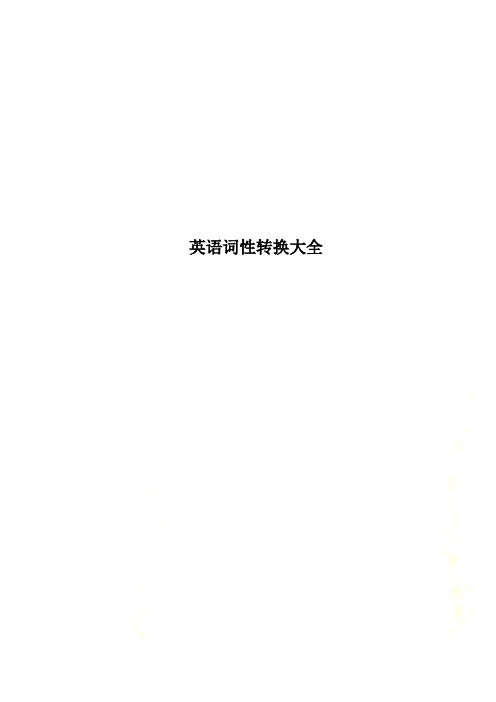
英语词性转换大全英语词性转换1. 名词变形容词(a)在名词后面加-y可以变成形容词(尤其是一些与天气有关的名词)例如:rain—rainy,cloud—cloudy, wind—windy, snow—snowy,health—healthy, luck—lucky,anger—angry guilt—guilty(内疚的) tourist—touristy (游客多的), salt (盐)—salty (咸的)silk(丝绸)—silky(丝绸般的), sleep—sleepy (昏昏欲睡的)注意:1)如果以重读闭音节结尾,且词尾只有一个辅音字母,这时应双写辅音字母再加“-y”。
如: sun—sunny, fun—funny, fog—foggy (有雾的), fur—furry(毛皮的)2)少数以不发音的e结尾的名词变为形容词时,应去掉e再加“-y”。
如: noise—noisy, ice—icy, shine—shiny (发亮的), taste(口味)—tasty(甜的)(b)名词后面加-ed,以e结尾的直接加d。
例如: spot(斑点)—spotted(有斑点的);talent—talented (有天赋的) organize—organized 有组织的; balance—balanced(平衡的)(c)一些抽象名词在词尾加-ful可以变为形容词例如:care—careful, thank—thankful, help —helpful,use—useful, meaning—meaningful(d)在名词后加-less构成含有否定意义的形容词例如:care—careless(粗心的), use—useless (无用的)hope—hopeless(没希望的),home—homeless (无家可归的)(e)一些以-ce结尾的名词,把-ce改为-t变成形容词例如: difference—different, silence—silent, confidence—confident(f)。
英语单词词性转换的基本规律
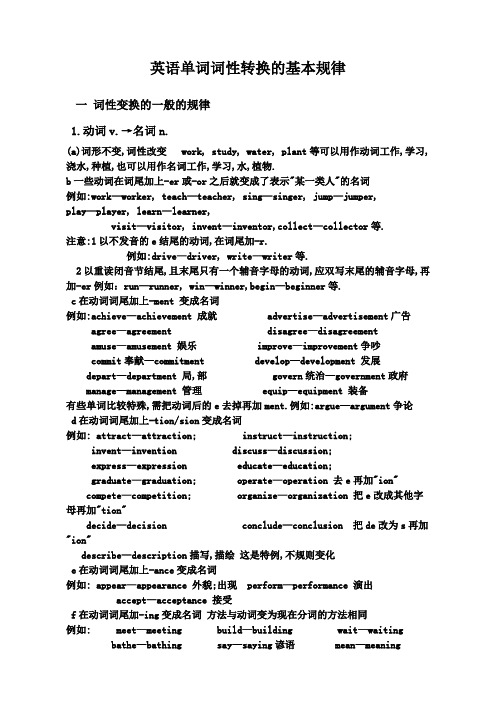
英语单词词性转换的基本规律一词性变换的一般的规律1.动词v.→名词n.(a)词形不变,词性改变 work, study, water, plant等可以用作动词工作,学习,浇水,种植,也可以用作名词工作,学习,水,植物.b一些动词在词尾加上-er或-or之后就变成了表示"某一类人"的名词例如:work—worker, teach—teacher, sing—singer, jump—jumper,play—player, learn—learner,visit—visitor, invent—inventor,collect—collector等.注意:1以不发音的e结尾的动词,在词尾加-r.例如:drive—driver, write—writer等.2以重读闭音节结尾,且末尾只有一个辅音字母的动词,应双写末尾的辅音字母,再加-er例如:run—runner, win—winner,begin—beginner等.c在动词词尾加上-ment 变成名词例如:achieve—achievement 成就 advertise—advertisement广告agree—agreement disagree—disagreementamuse—amusement 娱乐 improve—improvement争吵commit奉献—commitment develop—development 发展depart—department 局,部 govern统治—government政府manage—management 管理 equip—equipment 装备有些单词比较特殊,需把动词后的e去掉再加ment.例如:argue—argument争论d在动词词尾加上-tion/sion变成名词例如: attract—attraction; instruct—instruction;invent—invention discuss—discussion;express—expression educate—education;graduate—graduation; operate—operation 去e再加"ion"compete—competition; organize—organization 把e改成其他字母再加"tion"decide—decision conclude—conclusion 把de改为s再加"ion"describe—description描写,描绘这是特例,不规则变化e在动词词尾加上-ance变成名词例如: appear—appearance 外貌;出现 perform—performance 演出accept—acceptance 接受f在动词词尾加-ing变成名词方法与动词变为现在分词的方法相同例如: meet—meeting build—building wait—waiting bathe—bathing say—saying谚语 mean—meaningend —ending train —training wash—washing 注意:以重读闭音节结尾,且末尾只有一个辅音字母的动词,应双写末尾的辅音字母,再加-ing如:swim—swimming shop—shopping begin—beginningg其他一些比较特殊的变化例如: Beg乞讨—beggar乞丐 behave行为举止—behaviorknow知道—knowledge知识 fly—flight 飞行heat 加热—heat热量 hit 撞击—hit 轰动一时的人或物,碰撞mix 混合—mixture混合物 press按,压—pressure压力sit坐—seat 座位 succeed—success成功tour—tour旅游/ tourist 游客2.动词v.→形容词adj.a动词后面加able,以e结尾的动词则去e加able,表示具有此性质,特点或属性.例如: afford-affordable;love-lovableb动词后面加ed,以e结尾的动词则直接加d,表示被动性的属性或特点.例如: scatter-scattered use-usedc不规则的动词则必须记忆,记住其过去分词形式.规律不大,意义同b.3.名词n.→形容词adj.a在名词后面加-y可以变成形容词尤其是一些与天气有关的名词例如: rain—rainy, cloud—cloudy, wind—windy, snow—snowy,health—healthy, luck—lucky,anger—angry guilt—guilty内疚的 tourist—touristy游客多的 , salt 盐—salty 咸的silk丝绸—silky丝绸般的, sleep—sleepy 昏昏欲睡的注意:1如果以重读闭音节结尾,且词尾只有一个辅音字母,这时应双写辅音字母再加"-y". 如: sun—sunny, fun—funny, fog—foggy有雾的, fur—furry毛皮的2少数以不发音的e结尾的名词变为形容词时,应去掉e再加"-y".如: noise—noisy, ice—icy, shine—shiny发亮的, taste口味—tasty甜的b名词后面加-ed,以e结尾的直接加d.例如: spot斑点—spotted有斑点的; talent—talented 有天赋的organize—organized 有组织的; balance—balanced平衡的c一些抽象名词在词尾加-ful可以变为形容词例如:care—careful, thank—thankful, help—helpful,use—useful, meaning—meaningfuld在名词后加-less构成含有否定意义的形容词例如:care—careless粗心的, use—useless无用的hope—hopeless没希望的,home—homeless无家可归的e一些以-ce结尾的名词,把-ce改为-t变成形容词例如: difference—different, silence—silent, confidence—confidentf.在名词后加-ly变为形容词例如: friend—friendly, love—lovely, live---livelyg.在名词后加-ous变为形容词例如: danger—dangeroush名词后面加-al变为形容词例如: music—musical; medicine—medical 这个比较特殊i名词后面加-able变为形容词,如果以e结尾就去e再加"-able".例如: adjust—adjustable 可调整的 value—valuable有价值的j名词后面加-en变成形容词例如: wood—wooden 木制的 wool—woolen 羊毛的k一些表示国家的名词可以在词尾加-ese, -ish或-n构成表示国籍,语言的形容词例如:China—Chinese, Japan—Japanese, England—English,America—American, India—Indian, Australia —Australian 注意Canada—Canadian4.形容词adj.→副词adv.▲一般在形容词的词尾加-ly可以变成副词例如: quick—quickly, slow—slowly, loud—loudly, sudden—suddenly 等但是,以下几点值得注意:a 一些以"辅音字母+y"结尾的形容词,要把y改为i再加-ly例如: happy—happily, angry—angrily, lucky—luckily, heavy—heavily, noisy—noisilyb 有些以-ble或-le结尾的形容词,去掉e加-y例如:possible—possibly, terrible—terriblyc少数以e结尾的形容词,要去掉e再加-ly例如: true—truly但绝大多数以e结尾的形容词仍然直接加-ly 例如: polite—politely, wide—widelyd以-l结尾的形容词变为副词时要在词尾加-ly,以-ll结尾的才在词尾只加-y.例如: usual—usually, careful—carefully, useful—usefullyfull—fully 以-ll结尾的才只加y二 . 派生:指由一个词根加上前缀和或后缀构成另一个词的构词形式;1. 前缀:一般而言,前缀只改变词的含意,并不改变词的词性,有些前缀如en- , under- 等却使原词改变了词性,如 force n 力量— enforce v 加强;rich adj 富有—enrich v 使富裕;line n 线—underline v 在……之下画线;①表示否定意义的前缀,往往使原词变成它的反义词;前缀含义词根派生词dis- 不 like 喜欢 dislike 不喜欢un- 不 fair 公平 unfair 不公平il- 不;无 legal 合法的 illegal 非法的in- 不;非 correct 正确的 incorrect 不正确的im- 非 possible 可能的 impossible 不可能的ir- 不;非 regular 规则的 irregular 不规则的non- 无;非 smoker 烟民 non-smoker 不吸烟者en- 使 courage 勇气 encourage 鼓励fore- 前;预先 head 头 forehead 前额inter- 在……之间 national 国家的 international 国际的kilo- 千 meter 米 kilometer 千米micro- 微量的;微小的computer 计算机 microcomputer 微机mid- 在…中间 autumn 秋天 mid-autumn 中秋mis- 错误地 understand 理解 misunderstand 误解over- 在…上,过分;超过 head 头 overhead 在头顶上的re- 再;重;又 build 修建 rebuild 重建seimi- 半 circle 圆 semicircle 半圆2. 后缀:通常情况下,后缀不但改变词,还改变词性,常见的后缀有动词后缀、副词后缀、形容词后缀和名词后缀;①动词后缀:后缀含义词根派生词-en 变得… wide 宽的 widen 加宽;变宽-ify 使… beauty 美 beautify 使漂亮-ize/ise 使… real的 realize 实现②副词后缀:后缀含义词根派生词-ly 在…状态中 happy 高兴;幸福 happily 高兴地;幸福地-ward 朝…方向/地方 back 后 backward 向后;朝后③形容词后缀:后缀含义词根派生词-able/-ible 可…的;能…的 comfort 舒服 comfortable 舒适的-al/-ial 属于…的;有…特点 practice 练习 practical 实际的;可行的-ed 有…特性的 interest 兴趣 interested 感兴趣的-ful 充满…的 harm 伤害;损伤 harmful 有害的;致伤的-ish 有…属性的 self 自己 selfish 自私的-ive 有…倾向的 create 创造 creative 创造性的④名词后缀:后缀含义词根派生词-ance/-ence 指行为、状态 perform 表演 performance 演出;表演-dom 指性质、状态 free 自由的 freedom 自由-er/or 指人的身份 work 工作 worker 工人-ess 指人的身份 host 招待;主持 hostess 女主人-ese 表示国籍 China 中国 Chinese 中国人-ian 指人的身份 music 音乐 musician 音乐家-ism 与主义有关的 social 社会的 socialism 社会主义。
英语词性转换大全
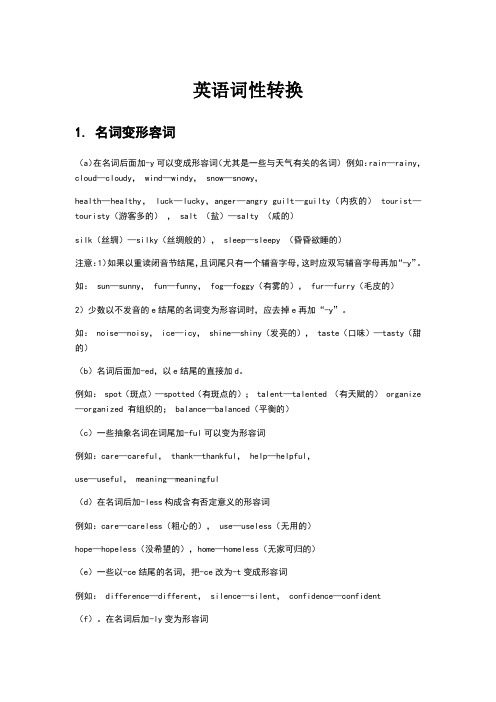
英语词性转换1. 名词变形容词(a)在名词后面加-y可以变成形容词(尤其是一些与天气有关的名词)例如:rain—rainy,cloud—cloudy, wind—windy, snow—snowy,health—healthy, luck—lucky,anger—angry guilt—guilty(内疚的) tourist—touristy(游客多的), salt (盐)—salty (咸的)silk(丝绸)—silky(丝绸般的), sleep—sleepy (昏昏欲睡的)注意:1)如果以重读闭音节结尾,且词尾只有一个辅音字母,这时应双写辅音字母再加“-y”。
如: sun—sunny, fun—funny, fog—foggy(有雾的), fur—furry(毛皮的)2)少数以不发音的e结尾的名词变为形容词时,应去掉e再加“-y”。
如: noise—noisy, ice—icy, shine—shiny(发亮的), taste(口味)—tasty(甜的)(b)名词后面加-ed,以e结尾的直接加d。
例如: spot(斑点)—spotted(有斑点的); talent—talented (有天赋的) organize —organized 有组织的; balance—balanced(平衡的)(c)一些抽象名词在词尾加-ful可以变为形容词例如:care—careful, thank—thankful, help—helpful,use—useful, meaning—meaningful(d)在名词后加-less构成含有否定意义的形容词例如:care—careless(粗心的), use—useless(无用的)hope—hopeless(没希望的),home—homeless(无家可归的)(e)一些以-ce结尾的名词,把-ce改为-t变成形容词例如: difference—different, silence—silent, confidence—confident(f)。
(完整版)英语词性转换归纳
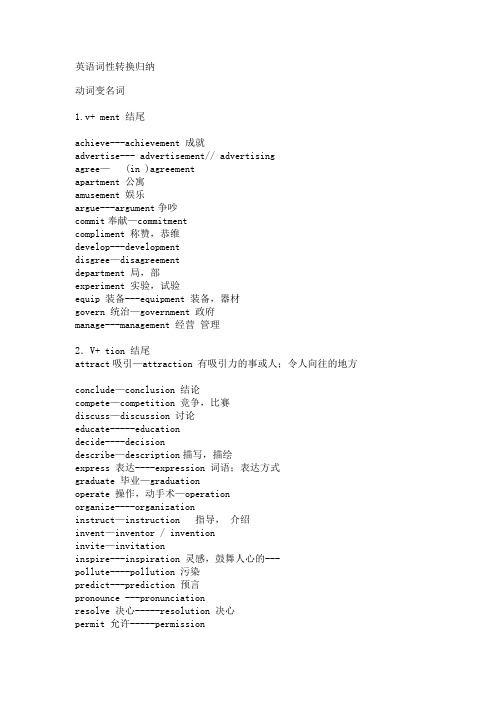
英语词性转换归纳动词变名词1.v+ ment 结尾achieve---achievement 成就advertise--- advertisement// advertisingagree— (in )agreementapartment 公寓amusement 娱乐argue---argument争吵commit奉献—commitmentcompliment 称赞,恭维develop---developmentdisgree—disagreementdepartment 局,部experiment 实验,试验equip 装备---equipment 装备,器材govern 统治—government 政府manage---management 经营管理2.V+ tion 结尾attract吸引—attraction 有吸引力的事或人;令人向往的地方conclude—conclusion 结论compete—competition 竞争,比赛discuss—discussion 讨论educate-----educationdecide----decisiondescribe—description描写,描绘express 表达----expression 词语;表达方式graduate 毕业—graduationoperate 操作,动手术—operationorganize----organizationinstruct—instruction 指导,介绍invent—inventor / inventioninvite—invitationinspire---inspiration 灵感,鼓舞人心的---pollute----pollution 污染predict---prediction 预言pronounce ---pronunciationresolve 决心-----resolution 决心permit 允许-----permissionsuggest-建议,暗示--suggestionsolve解决-----solution 解决方法3.V+ ance 结尾appear—appearance 外貌,出现perform----performance 演出4.V+ ing 结尾bathe 洗澡---bathingend 结束----ending 结尾,结局train 训练---trainingmean ---- meaning 意义say-----saying 谚语5.V+ 其他Beg(乞讨)—beggar 乞丐behave 行为,举止----behaviorknow---knowledgefly—flight 飞行heat 加热---heat 热量hit 撞击------hit 轰动一时的人或物,碰撞mix 混合-----mixture 混合物press 按,压—pressure 压力sit-----seat 座位succeed-- successtour 在-----旅游,在-----作巡回演出直接+地点 tour China ---tour 旅游/ tourist 游客名词变形容词1名词+yAnger 生气-----angryhunger---hungryfog—foggy有雾的fur----furry 毛皮的guilt 罪恶---guilty 内疚的health---healthyluck---luckycloud---cloudywind—windyrain---rainysnow---snowysun—sunnytourist------touristy 游客多的business---busysalt 盐--- salty 咸的shine---shiny 发亮的silk 丝绸—silky 丝绸般的sleep---sleepy 昏昏欲睡的taste 口味,品味------tasty 甜的2.名词+ edbalance –balanced 平衡的spot 斑点,地点----spotted 有斑点的talent-----talented 有天赋的organized 有组织的distusted 厌恶的offended 生气的crowded 拥挤的polluted 被污染的pleased 高兴的3.名词+ ful/lessmeaning—meaningful 有意义的care—careful/ careless 小心的;粗心的help---helpful / helpless home—homeless 无家可归的colour---colourfulpain 疼痛---painful 痛苦的use---useless/ usefulthank—thankful 充满感激的peace 和平 ---- peaceful 平静的,宁静的playful 顽皮的,爱玩耍的4.名词+ ableadjustable 可调整的comfort---comfortableknowledge---knowledgeablesuit 一套-----suitable 合适的5.名词+ ousenormous 巨大的danger—dangerousmystery 神秘-----mysterious 神秘的6.ce 变 tconfidence----confidentdifference---different7. al 结尾medicine 药----medical 医学的music---musicalnature---natural 自然的person---personal (私人的) nation—national 国家的education---educational有教育意义的tradition----traditional 传统的origin起源---original 新颖的;独创的8.名词+ lyfriend—friendlylive---lively 活跃的,有生气的love—lovely 可爱的9.+ en 结尾wood—wooden 木制的wool—woolen 羊毛的10. 其他energy精力---energeticfool 傻子—foolish 愚蠢的freedom 自由—free 空的,免费的height 高度—highillness 疾病--- illlove—loving 慈爱的death---deadpleasure---pleasant / pleased popularity 流行性—popularpride---proudscientist----scientific 科学的方位的词表达名词—形容词East—easternWest—westernSouth—southernNorth---northernIn the west of ChinaIn the western part of China四大洲名词-----形容词Asia 亚洲–---- AsianAfrica 非洲----- AfricanEurope欧洲----- EuropeanAmerica 美洲-----American形容词变副词1.形容词+ lybad—badlybright—brightly 明亮地casual—casually 随意地clear—clearly 清楚地complete—completely 完全correct---correctly 正确地final--finallyfortunate—fortunately幸运地general—generally 一般来讲loud—loudlyparticular 特殊的,独特的—particularly polite—politelyproper 合适的-,恰当的---properlymain------mainly 主要地most 多数-----mostly 多半,大多数normal---normally 正常地quick—quicklyquiet—quietly 轻轻地,安静地real—reallyrecent 最近的----recently 最近;近来hard 难的;努力地---hardly 几乎不late 迟的—lately 最近;近来sad--sadlyslow---slowlyspecial—specially 专门,特殊地specific---specifically 特定地,明确地strong—strongly 坚决地,强烈地sudden—suddenly突然usual—usually2. 以le 结尾的去e + ycomfortable---comfortablygentle—gentlypossible---possiblysimple ----simply 仅仅;只;简单地terrible---terribly3. 辅音字母+ y 变 ilyeasy—easilyheavy—heavilyhappy--happily4.特殊good—well好地 well 身体健康的,井true—truly名词---形容词—副词beauty 美,美人—beautiful—beautifully care—careful—carefully care—careless—carelesslydifference---different---differently happiness—happy—happily hunger—hungry--hungrily health—healthy—healthily luck—lucky—luckily noise—noisy—noisily pride—proud—proudly骄傲地sadness—sad—sadlysafety 安全;安全的地方—safe—safely silence—silent---silently 默默地success—successful—successfully truth—true—truly unluck—unlucky—unluckilywonder 奇迹—wonderful—wonderfully既是形容词又是副词early get up early ;an early trainlate be late for classcome late for schooldeep dive deep into the seaa hole deep largehigh jump high;a high mountainhard a hard question;a hard stone work hard / study hardrain hardlong It takes too longIt takes a long timefar jump farMy home is far from school straight a straight linego straight along here(1)v.-n.动词转化为名词,post-postage mail-mailweigh-weight advise-advice(2)v.-n.-a.动词转化成名词-形容词act-actor / actress-activechange-change-changeable(3) v.-a.-ad.-n.动词转化成形容词,副词,名词fill-fullneed-necessary-necessarilyinterest(v. / n.) interested /interesting (4)n. a. n. a.名词转化为形容词person personal ( 个人的; 私人的)fun funny(5)n. pl. n. pl.名词转化为名词复数gentleman gentlemen human humans(6)a. ad. a. ad.形容词转化为副词possible possibly probable probably(7)a. ad. n.形容词转化为副词,名词true truly truthlucky luckily luck(8)原级比较级最高级far farther / further farthest / furthestlittle less least一、名词变为形容词的方法1. 在名词后面加-y可以变成形容词(尤其是一些与天气有关的名词)。
英语单词词性转换

英语单词词性转换一、动词v.→名词n.1、词尾加上-er或-or之后就变成了表示"某一类人"的名词例如:work—worker, teach—teacher, sing—singer,jump—jumper, play—player, learn—learner,visit—visitor, invent—inventor,collect—collector等.注意:1以不发音的e结尾的动词,在词尾加-r.例如:drive—driver, write—writer等.2以辅音字母开头并以元音字母加辅音字母结尾的单词,应双写末尾的辅音字母再加er; 例如:run—runner, win—winner,begin—beginner等.2.在动词词尾加上-ment 变成名词例如:achieve—achievement 成就advertise—advertisement例如:argue—argument争论3.在动词词尾加上-tion/sion变成名词例如: attract—attraction; instruct—instruction;invent—invention discuss—discussion;express—expression educate—education;graduate—graduation; operate—operation 去e再加"ion"compete—competition; organize—organization 把e改成其他字母再加"tion"decide—decision conclude—conclusion 把de改为s再加"ion"describe—description描写,描绘这是特例,不规则变化4.在动词词尾加上-ance变成名词例如: appear—appearance 外貌;出现perform—performance 演出accept—acceptance 接受resist-resistance n.抵抗,阻力5.在动词词尾加-ing变成名词方法与动词变为现在分词的方法相同例如:meet—meeting build—building wait—waitingbathe—bathing say—saying谚语 mean—meaning注意:以辅音字母开头并以元音字母加辅音字母结尾的单词,应双写末尾的辅音字母再加-ing 如:swim—swimming shop—shopping begin—beginning二、动词v.→形容词adj.1.动词后面加able,以e结尾的动词则去e加able,表示具有此性质,特点或属性.例如: afford-affordable;love-lovable2.动词后面加ed,以e结尾的动词则直接加d,表示被动性的属性或特点.例如: scatter-scattered use-used3不规则的动词则必须记忆,记住其过去分词形式.规律不大,意义同b.三.名词n.→形容词adj.1.在名词后面加-y可以变成形容词尤其是一些与天气有关的名词例如: rain—rainy, cloud—cloudy, wind—windy, snow—snowy,health—healthy, luck—lucky,anger—angry guilt—guilty内疚的tourist—touristy游客多的 , salt 盐—salty 咸的silk丝绸—silky丝绸般的, sleep—sleepy 昏昏欲睡的注意:1如果以辅音字母开头并以元音字母加辅音字母结尾,这时应双写辅音字母再加"-y".如: sun—sunny, fun—funny, fog—foggy有雾的, fur—furry毛皮的2少数以不发音的e结尾的名词变为形容词时,应去掉e再加"-y".如: noise—noisy, ice—icy, shine—shiny发亮的, taste口味—tasty甜的2.名词后面加-ed,以e结尾的直接加d.例如: spot斑点—spotted有斑点的; talent—talented 有天赋的organize—organized 有组织的; balance—balanced平衡的3.一些抽象名词在词尾加-ful可以变为形容词例如:care—careful, thank—thankful, help—helpful,use—useful, meaning—meaningful4.在名词后加-less构成含有否定意义的形容词例如:care—careless粗心的, use—useless无用的hope—hopeless没希望的,home—homeless无家可归的5.一些以-ce结尾的名词,把-ce改为-t变成形容词例如: difference—different, silence—silent, confidence—confident 6.在名词后加-ly变为形容词例如: friend—friendly, love—lovely, live---lively7.在名词后加-ous变为形容词例如: danger—dangerous prosperous a 繁荣的pro 在前+sper 希望+ous 8.名词后面加-al变为形容词例如: music—musical; medicine—medical 这个比较特殊9名词后面加-able变为形容词,如果以e结尾就去e再加"-able".例如: adjust—adjustable 可调整的 value—valuable有价值的10.名词后面加-en变成形容词例如: wood—wooden 木制的 wool—woolen 羊毛的四.形容词adj.→副词adv.▲一般在形容词的词尾加-ly可以变成副词例如: quick—quickly, slow—slowly, loud—loudly, sudden—suddenly 等例如:possible—possibly, terrible—terribly。
英语词性转换归纳汇总

英语词性转换归纳汇总1动词变名词1.v+ ment 结尾achieve ——achievement 成就advertise ——advertisement 广告agree ——agreement 同意amuse——amusement 娱乐commit ——commitment 承诺,奉献develop ——development 发展disagree ——disagreement 不赞同equip 装备——equipment 装备,器材govern 统治——government 政府manage——management 经营,管理argue ——argument 争吵2.V+ ion 结尾attract ——attraction 吸引discuss ——discussion 讨论express ——-expression 词语;表达instruct ——instruction 用法说明invent——invention 发明predict ——prediction 预言impress ——impression 印象suggest ——suggestion 建议,暗示educate ——education 教育graduate ——graduation 毕业operate ——operation 操作,动手术illustrate ——illustration 阐明,举例说明pollute ——pollution 污染introduce ——introduction 介绍organize ——organization组织imagine ——imagination 想象力inspire——inspiration 灵感,鼓舞人心的事invite ——invitation 邀请compete ——competition 竞争,比赛pronounce ——pronunciation发音admit ——admission 承认permit ——permission 允许conclude ——conclusion 结论decide ——decision 决定describe ——description描写,描绘resolve ——resolution 决心solve ——solution 解决方法3.V+ ance 结尾allow ——allowance 允许appear ——appearance 外貌,出现perform ——performance 演出exist ——existence 存在4.V+ ing 结尾end ——ending 结尾,结局train ——training训练mean ——meaning 意义say——saying 谚语remind ——reminding提醒bathe ——bathing沐浴5.词尾加-er或-or后变成表示“某一类人”的名词work——worker 工人teach——teacher老师sing——singer 歌手jump——jumper跳高运动员play——player表演者、运动员learn——learner 学习者visit——visitor访问者invent——inventor发明家6.V+ 其他beg——beggar 乞丐sit——seat 座位believe ——belief 信仰behave ——behavior 行为know——knowledge 知识fly——flight 飞行mix ——mixture 混合物press ——pressure 压力serve ——service 服务succeed ——success 成功pursue ——pursuit 追求,从事propose ——proposal 建议withdraw ——withdrawal 取钱;收回;撤退survive ——survival--survivor 幸存者arrive ——arrival到达analyze ——analysis 分析2形容词变名词1.词尾ent改为ency或enceefficient有效率的——efficiency 效率patient——patience/impatience 耐性/无耐心dependent——dependence依赖性independent——independence 独立性urgent——urgency 紧急2.ble结尾,ble改为bility possible——possibility 可能responsible——responsibility 责任;职责3.其他accurate——accuracy 准确性prosperous——prosperity 繁荣true——truth 真相wide——width 宽度long——length 长度high——height 高度3名词/动词变形容词1.名词+yguilt 罪恶——guilty 内疚的health——healthy 健康的luck——lucky 幸运的cloud——cloudy 多云的wind—windy 多风的rain——rainy 多雨的snow——snowy 多雪的tourist ——touristy 游客多的er结尾,改er为ry hunger——hungry 饥饿的anger ——angry 生气的fog——foggy 有雾的sun——sunny 阳关灿烂的fur——furry 毛皮的shine——shiny 发亮的taste ——tasty 美味的2. 名词/动词+ ed以辅音+辅音结尾的单词,直接加ed talent ——talented 有天赋的offend ——offended 生气的crowd ——crowded 拥挤的以元音字母e结尾的单词直接加dbalance ——balanced 平衡的organize——organized 有组织的pollute ——polluted 被污染的please ——pleased 高兴的元音加辅音结尾的单词,词尾辅音双写再加edspot ——spotted 有斑点的3.名词+ ful/lesscare ——careful/ careless 小心的/ 粗心的help——helpful / helpless 有帮助的/ 无助的use——useful/ useless有用的/ 无用的meaning ——meaningful / meaningless有意义的/无意义的colour——colourful /colourless多彩的/无色的pain 疼痛——painful /painless痛苦的/ 不痛的thank——thankful / thankless 充满感激的/ 不知感恩的peace 和平——peaceful 和平的play游戏——playful 爱玩耍的home ——homeless 无家可归的4.名词/动词+ ablechange ——changeable 易变的adjust——adjustable 可调整的comfort——comfortable 舒适的knowledge——knowledgeable 知识渊博的suit ——suitable 合适的动词以辅音加y结尾把y变i 加able ,deny——deniable 可否认的rely——reliable 可靠的5.名词+ ous courage——courageous 勇敢的danger——dangerous 危险的以y结尾,改y为i再加ousmystery 神秘——mysterious 神秘的6.ce 变t confidence——confident 自信的difference——different 不同的dependence ——dependent 依赖他人的independence——independent 独立的7.词尾加aladdition——additional 附加的,额外的music——musical 音乐的person——personal (私人的) nation——national 国家的education——educational有教育意义的tradition——traditional 传统的origin起源——original 新颖的;独创的以元音字母e 结尾的单词,去掉词尾元音加al nature——natural 自然的globe——global 全球的特例:class——classical 经典的medicine 药——medical 医学的grammar——grammatical 语法的8.名词+ ly friend——friendly 友好的live——lively 活跃的,有生气的love——lovely 可爱的week——weekly 每周的man——manly 男子气概的;强壮的9.词尾+ enwood——wooden 木制的wool——woolen 羊毛的10. 表示方位的词East——eastern West——western South——southernNorth——northern11.四大洲Asia 亚洲——AsianAfrica 非洲——AfricanEurope欧洲——EuropeanAmerica 美洲——American12. 其他energy精力——energetic 精力充沛的strategy——strategic 战略的scientist——scientific 科学的fool 傻子——foolish 愚蠢的love——loving 慈爱的pleasure——pleasant令人愉快的/ pleased高兴的pride——proud 自豪的4形容词变动词1.词尾加ize modern——modernize 使...现代化social——socialize 使...社会化2.词尾加enfast——fasten 使固定;集中于short——shorten 缩短wide——widen 放宽less——lessen 使...减少特例(有变形):long——lengthen 使延长strong ——strengthen 加强;巩固3.词前加enlarge ——enlarge 扩大;放大5形容词变副词1.形容词+ lybad——badly 坏地bright——brightly 明亮地casual——casually 随意地clear——clearly 清楚地complete——completely 完全correct——correctly 正确地final——finally 最后fortunate——fortunately幸运地general——generally 一般来讲loud——loudly 大声地particular ——particularly特别地polite——politely 礼貌地proper ——properly适当地main——mainly 主要地most ——mostly 多半,大多数normal——normally 正常地quick——quickly 迅速地quiet——quietly 轻轻地,安静地real——really 真正地recent ——recently 最近;近来slow——slowly 缓慢地special——specially 专门,特殊地specific——specifically 特定地,明确地strong——strongly 坚决地,强烈地sudden——suddenly突然usual——usually 通常2. 以le 结尾的,去e + y comfortable——comfortably 舒服地gentle——gently 温柔地possible——possibly 可能地simple——simply 仅仅;只;简单地terrible——terribly 非常;极度地3. 辅音字母+ y 变y为ilyheavy——heavily 沉重地happy——happily 快乐地4.特殊good——well好地true——truly 真实地。
英语单词词性转换
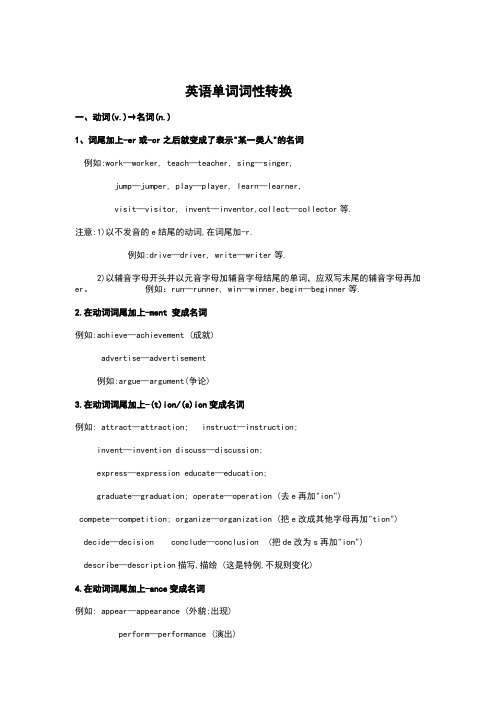
英语单词词性转换一、动词(v.)→名词(n.)1、词尾加上-er或-or之后就变成了表示"某一类人"的名词例如:work—worker, teach—teacher, sing—singer,jump—jumper, play—player, learn—learner,visit—visitor, invent—inventor,collect—collector等.注意:1)以不发音的e结尾的动词,在词尾加-r.例如:drive—driver, write—writer等.2)以辅音字母开头并以元音字母加辅音字母结尾的单词,应双写末尾的辅音字母再加er。
例如:run—runner, win—winner,begin—beginner等.2.在动词词尾加上-ment 变成名词例如:achieve—achievement (成就)advertise—advertisement例如:argue—argument(争论)3.在动词词尾加上-(t)ion/(s)ion变成名词例如: attract—attraction; instruct—instruction;invent—invention discuss—discussion;express—expression educate—education;graduate—graduation; operate—operation (去e再加"ion")compete—competition; organize—organization (把e改成其他字母再加"tion")decide—decision conclude—conclusion (把de改为s再加"ion")describe—description描写,描绘 (这是特例,不规则变化)4.在动词词尾加上-ance变成名词例如: appear—appearance (外貌;出现)perform—performance (演出)accept—acceptance (接受)resist-resistance n.抵抗,阻力5.在动词词尾加-ing变成名词 (方法与动词变为现在分词的方法相同)例如:meet—meeting build—building wait—waitingbathe—bathing say—saying(谚语) mean—meaning注意:以辅音字母开头并以元音字母加辅音字母结尾的单词,应双写末尾的辅音字母再加-ing如:swim—swimming shop—shopping begin—beginning二、动词(v.)→形容词(adj.)1.动词后面加able,以e结尾的动词则去e加able,表示具有此性质,特点或属性.例如: afford-affordable;love-lovable2.动词后面加ed,以e结尾的动词则直接加d,表示被动性的属性或特点.例如: scatter-scattered use-used3不规则的动词则必须记忆,记住其过去分词形式.规律不大,意义同(b).三.名词(n.)→形容词(adj.)1.在名词后面加-y可以变成形容词(尤其是一些与天气有关的名词)例如: rain—rainy, cloud—cloudy, wind—windy, snow—snowy,health—healthy, luck—lucky,anger—angry guilt—guilty(内疚的)tourist—touristy(游客多的) , salt (盐)—salty (咸的)silk(丝绸)—silky(丝绸般的), sleep—sleepy (昏昏欲睡的)注意:1)如果以辅音字母开头并以元音字母加辅音字母结尾,这时应双写辅音字母再加"-y".如: sun—sunny, fun—funny, fog—foggy(有雾的), fur—furry(毛皮的)2)少数以不发音的e结尾的名词变为形容词时,应去掉e再加"-y".如: noise—noisy, ice—icy, shine—shiny(发亮的), taste(口味)—tasty(甜的) 2.名词后面加-ed,以e结尾的直接加d.例如: spot(斑点)—spotted(有斑点的); talent—talented (有天赋的)organize—organized 有组织的; balance—balanced(平衡的)3.一些抽象名词在词尾加-ful可以变为形容词例如:care—careful, thank—thankful, help—helpful,use—useful, meaning—meaningful4.在名词后加-less构成含有否定意义的形容词例如:care—careless(粗心的), use—useless(无用的)hope—hopeless(没希望的),home—homeless(无家可归的)5.一些以-ce结尾的名词,把-ce改为-t变成形容词例如: difference—different, silence—silent, confidence—confident6.在名词后加-ly变为形容词例如: friend—friendly, love—lovely, live---lively7.在名词后加-ous变为形容词例如: danger—dangerous prosperous a 繁荣的(pro 在前+sper 希望+ous)8.名词后面加-al变为形容词例如: music—musical; medicine—medical (这个比较特殊)9名词后面加-able变为形容词,如果以e结尾就去e再加"-able".例如: adjust—adjustable 可调整的 value—valuable有价值的10.名词后面加-en变成形容词例如: wood—wooden 木制的 wool—woolen 羊毛的四.形容词(adj.)→副词(adv.)▲一般在形容词的词尾加-ly可以变成副词例如: quick—quickly, slow—slowly, loud—loudly, sudden—suddenly 等例如:possible—possibly, terrible—terribly。
英语词性转换归纳汇总,好学易懂。

一、动词变名词imagine —— imagination 想象力inspire——inspiration 灵感,鼓舞人心的invite —— invitation 邀请compete —— competition 竞争,比赛pronounce ——pronunciation发音admit —— admission 承认permit —— permission 允许conclude —— conclusion 结论decide —— decision 决定describe —— description描写,描绘resolve —— resolution 决心solve ——solution 解决方法3.V+ ance 结尾allow —— allowance 允许appear —— appearance 外貌 ,出现perform —— performance 演出exist —— existance 存在4.V+ ing 结尾end —— ending 结尾,结局train ——training训练mean —— meaning 意义say—— saying 谚语remind —— reminding提醒bathe ——bathing沐浴5.词尾加-er或-or后变成表示“某一类人”的名词work——worker 工人teach——teacher老师sing——singer 歌手jump——jumper跳高运动员play——player表演者、运动员learn——learner 学习者visit——visitor访问者invent——inventor发明家6.V+ 其他beg——beggar 乞丐sit——seat 座位believe —— belief 信仰behave —— behavior 行为know—— knowledge 知识fly—— flight 飞行mix —— mixture 混合物press —— pressure 压力serve —— service 服务succeed ——success 成功pursue —— pursuit 追求,从事propose —— proposal 建议withdraw —— withdrawal 取钱;收回;撤退survive —— survival--survivor 幸存者arrive —— arrival到达analyze —— analysis 分析形容词变名词dependent——dependence依赖性independent——independency 独立性urgent——urgency 紧急2.ble结尾,ble改为bilitypossible——possibility 可能responsible——responsibility 责任;职责3.其他accurate——accuracy 准确性prosperous——prosperity 繁荣true——truth 真相wide——width 宽度long——length 长度high——height 高度二、名词/动词变形容词er结尾,改er为ryhunger——hungry 饥饿的anger —— angry 生气的fog—— foggy 有雾的sun—— sunny 阳关灿烂的fur—— furry 毛皮的shine——shiny 发亮的taste —— tasty 美味的2. 名词/动词+ ed以辅音+辅音结尾的单词,直接加edtalent —— talented 有天赋的offend ——offended 生气的crowd ——crowded 拥挤的以元音字母e结尾的单词直接加dbalance —— balanced 平衡的organize——organized 有组织的pollute ——polluted 被污染的please ——pleased 高兴的元音加辅音结尾的单词,词尾辅音双写再加edspot —— spotted 有斑点的3.名词+ ful/lesscare —— careful/ careless 小心的/ 粗心的help—— helpful / helpless 有帮助的/ 无助的use—— useful/ useless有用的 / 无用的meaning —— meaningful / meaningless有意义的/无意义的colour—— colourful /colourless多彩的/无色的pain 疼痛 ——painful /painless痛苦的/ 不痛的thank—— thankful / thankless 充满感激的/ 不知感恩的 peace 和平 —— peaceful 和平的play游戏 —— playful 爱玩耍的home —— homeless 无家可归的4.名词/动词+ ablechange —— changeable 易变的adjust——adjustable 可调整的comfort——comfortable 舒适的knowledge——knowledgeable 知识渊博的suit ——suitable 合适的动词以辅音加y结尾 把y变i 加able ,deny—— deniable 可否认的rely—— reliable 可靠的5.名词+ ouscourage——courageous 勇敢的danger—— dangerous 危险的以y结尾,改y为i再加ousmystery 神秘—— mysterious 神秘的6.ce 变 tconfidence—— confident 自信的difference——different 不同的dependence —— dependent 依赖他人的independence—— independent 独立的7.词尾加 aladdition—— additional 附加的,额外的music—— musical 音乐的person——personal (私人的) nation—— national 国家的education——educational有教育意义的tradition—— traditional 传统的origin起源——original 新颖的;独创的以元音字母结尾的单词,去掉词尾元音加al nature——natural 自然的globe—— global 全球的特例:class—— classical 经典的medicine 药——medical 医学的grammar—— grammatical 语法的8.名词+ lyfriend—— friendly 友好的live——lively 活跃的,有生气的love——lovely 可爱的week——weekly 每周的man——manly 男子气概的;强壮的9.词尾+ enwood—— wooden 木制的wool—— woolen 羊毛的10. 表示方位的词East——easternWest——westernSouth——southernNorth——northern11.四大洲Asia 亚洲—— AsianAfrica 非洲——AfricanEurope欧洲—— EuropeanAmerica 美洲——American12. 其他energy精力——energetic 精力充沛的strategy——strategic 战略的scientist——scientific 科学的fool 傻子——foolish 愚蠢的love——loving 慈爱的pleasure——pleasant令人愉快的 / pleased高兴的pride——proud 自豪的三、形容词变动词less——lessen 使...减少特例(有变形):long——lengthen 使延长strong ——strengthen 加强;巩固3.词前加enlarge —— enlarge 扩大;放大四、形容词变副词real——really 真正地recent ——recently 最近;近来sad——sadly 悲哀地slow——slowly 缓慢地special——specially 专门,特殊地specific——specifically 特定地,明确地strong——strongly 坚决地, 强烈地sudden——suddenly突然usual——usually 通常2. 以le 结尾的, 去e + y comfortable——comfortably 舒服地gentle——gently 温柔地possible——possibly 可能地simple——simply 仅仅;只;简单地terrible——terribly 非常;极度地3. 辅音字母+ y 变y为 ily easy——easily 容易地heavy——heavily 沉重地happy——happily 快乐地4.特殊good——well好地true——truly 真实地。
词性转换规律
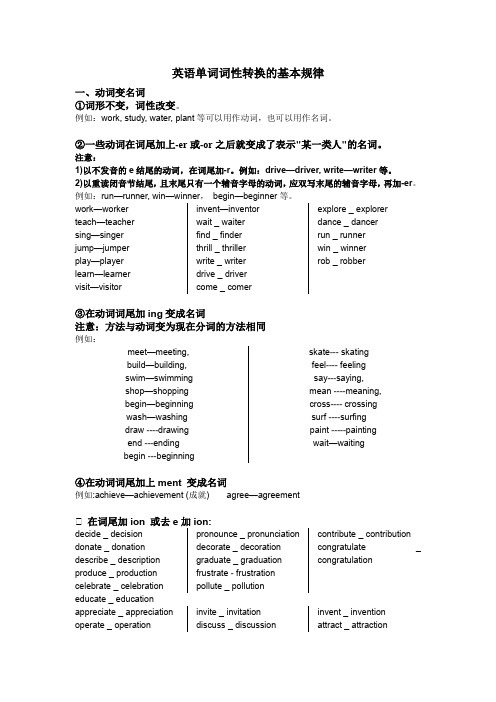
英语单词词性转换的基本规律一、动词变名词①词形不变,词性改变。
例如:work, study, water, plant等可以用作动词,也可以用作名词。
②一些动词在词尾加上-er或-or之后就变成了表示"某一类人"的名词。
注意:1)以不发音的e结尾的动词,在词尾加-r。
例如:drive—driver, write—writer等。
2)以重读闭音节结尾,且末尾只有一个辅音字母的动词,应双写末尾的辅音字母,再加-er。
例如:run—runner, win—winner,begin—beginner等。
work—worker teach—teacher sing—singer jump—jumper play—player learn—learner visit—visitor invent—inventorwait _ waiterfind _ finderthrill _ thrillerwrite _ writerdrive _ drivercome _ comerexplore _ explorerdance _ dancerrun _ runnerwin _ winnerrob _ robber③在动词词尾加ing变成名词注意:方法与动词变为现在分词的方法相同例如:meet—meeting, build—building, swim—swimming shop—shopping begin—beginning wash—washing draw ----drawing end ---ending begin ---beginning skate--- skating feel---- feeling say---saying, mean ----meaning, cross---- crossing surf ----surfing paint -----painting wait—waiting④在动词词尾加上ment 变成名词例如:achieve—achievement (成就) agree—agreement ⑤在词尾加ion 或去e加ion:decide _ decision donate _ donation describe _ description produce _ production celebrate _ celebration pronounce _ pronunciationdecorate _ decorationgraduate _ graduationfrustrate - frustrationpollute _ pollutioncontribute _ contributioncongratulate _congratulationeducate _ educationappreciate _ appreciation operate _ operation invite _ invitationdiscuss _ discussioninvent _ inventionattract _ attraction⑥其他一些比较特殊的变化know ---- knowledge please ---pleasure enjoy--- enjoyment practise--- practice die ---death succeed--- success weigh ---weight sit-- seatchange --chance enter --entrancefly --flightdiscover-- discovery appear-- appearance breathe-- breath二、名词变形容词①在名词后面加-y可以变成形容词(尤其是一些与天气有关的名词)例如: rain—rainy, cloud—cloudy, salt —salty sleep—sleepy注意:1)如果以重读闭音节结尾,且词尾只有一个辅音字母,这时应双写辅音字母再加"-y".如: sun—sunny, fun—funny, fog—foggy2)少数以不发音的e结尾的名词变为形容词时,应去掉e再加"-y".如: noise—noisy, ice—icy②名词后面加-ed,以e结尾的直接加d,表示被动性的属性或特点.talent—talented (有天赋的) use-usedplease - pleasedunite - unitedexcite - excitedclose - closedrelax - relaxed surprise - surprised, develop - developed interest - interested crowd - crowded pollute - polluted③一些抽象名词在词尾加-ful可以变为形容词use - useful care - careful, help - helpful, thank - thankful peace - peaceful, forget - forgetful, play - playful, succeed - successful, wonder - wonderful④在名词后加-less构成含有否定意义的形容词例如:care—careless, use—uselesshope—hopeless,home—homeless⑤一些以-ce结尾的名词,把-ce改为-t变成形容词例如: difference—different, silence—silent, confidence—confident ⑥在名词后加-ly变为形容词例如: friend—friendly, love—lovely, live---lively⑦在名词后加-ous变为形容词例如: danger—dangerous humor—humorous⑧名词后面加-al变为形容词例如: music—musical; medicine—medical (这个比较特殊) educate - educational ⑨名词后面加-able变为形容词,如果以e结尾就去e再加"-able".例如: adjust—adjustable 可调整的value—valuable有价值的know - knowledgeable, enjoy - enjoyabe, suit - suitableadjust - adjustable, comfort - comfortable⑩名词后面加-en变成形容词例如: wood—wooden 木制的wool—woolen 羊毛的speak - spoken, break - broken⑪一些表示国家的名词可以在词尾加-ese, -ish或-n构成表示国籍,语言的形容词例如:China—Chinese, England—English,America—American, Australia —Australian(注意Canada—Canadian)⑫其它:lose - lost,fool - foolish,live - lively / alive /living, sleep - sleepy / sleeping / asleep, wake - awake, taste - tastydie - dead,world - worldwide。
英语单词词性转换
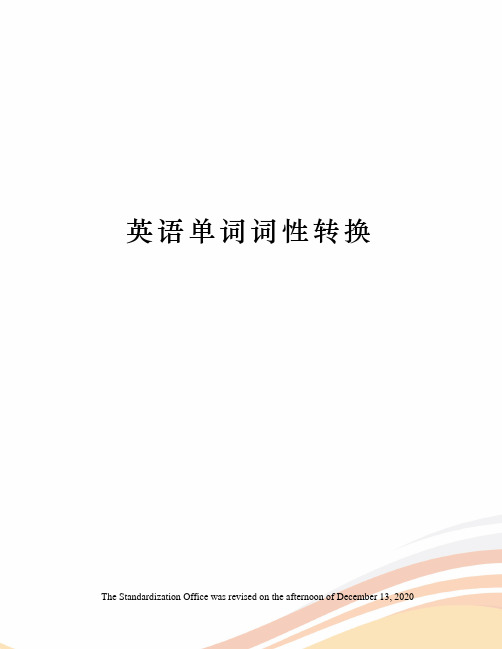
英语单词词性转换The Standardization Office was revised on the afternoon of December 13, 2020英语单词词性转换一、动词(v.)→名词(n.)1、词尾加上-er或-or之后就变成了表示"某一类人"的名词例如:work—worker, teach—teacher, sing—singer,jump—jumper, play—player, learn—learner,visit—visitor, invent—inventor,collect—collector等.注意:1)以不发音的e结尾的动词,在词尾加-r.例如:drive—driver, write—writer等.2)以辅音字母开头并以元音字母加辅音字母结尾的单词,应双写末尾的辅音字母再加er。
例如:run—runner, win—winner,begin—beginner 等.2.在动词词尾加上-ment 变成名词例如:achieve—achievement (成就)advertise—advertisement例如:argue—argument(争论)3.在动词词尾加上-(t)ion/(s)ion变成名词例如: attract—attraction; instruct—instruction;invent—invention discuss—discussion;express—expression educate—education;graduate—graduation; operate—operation (去e再加"ion")compete—competition; organize—organization (把e改成其他字母再加"tion")decide—decision conclude—conclusion (把de改为s再加"ion")describe—description描写,描绘 (这是特例,不规则变化)4.在动词词尾加上-ance变成名词例如: appear—appearance (外貌;出现)perform—performance (演出)accept—acceptance (接受)resist-resistance n.抵抗,阻力5.在动词词尾加-ing变成名词 (方法与动词变为现在分词的方法相同)例如:meet—meeting build—building wait—waitingbathe—bathing say—saying(谚语) mean—meaning注意:以辅音字母开头并以元音字母加辅音字母结尾的单词,应双写末尾的辅音字母再加-ing如:swim—swimming shop—shopping begin—beginning二、动词(v.)→形容词(adj.)1.动词后面加able,以e结尾的动词则去e加able,表示具有此性质,特点或属性.例如: afford-affordable;love-lovable2.动词后面加ed,以e结尾的动词则直接加d,表示被动性的属性或特点.例如: scatter-scattered use-used3不规则的动词则必须记忆,记住其过去分词形式.规律不大,意义同(b).三.名词(n.)→形容词(adj.)1.在名词后面加-y可以变成形容词(尤其是一些与天气有关的名词)例如: rain—rainy, cloud—cloudy, wind—windy, snow—snowy,health—healthy, luck—lucky,anger—angry guilt—guilty(内疚的)tourist—touristy(游客多的) , salt (盐)—salty (咸的)silk(丝绸)—silky(丝绸般的), sleep—sleepy (昏昏欲睡的)注意:1)如果以辅音字母开头并以元音字母加辅音字母结尾,这时应双写辅音字母再加"-y".如: sun—sunny, fun—funny, fog—foggy(有雾的), fur—furry(毛皮的)2)少数以不发音的e结尾的名词变为形容词时,应去掉e再加"-y".如: noise—noisy, ice—icy, shine—shiny(发亮的), taste(口味)—tasty(甜的)2.名词后面加-ed,以e结尾的直接加d.例如: spot(斑点)—spotted(有斑点的); talent—talented (有天赋的)organize—organized 有组织的; balance—balanced(平衡的)3.一些抽象名词在词尾加-ful可以变为形容词例如:care—careful, thank—thankful, help—helpful,use—useful, meaning—meaningful4.在名词后加-less构成含有否定意义的形容词例如:care—careless(粗心的), use—useless(无用的)hope—hopeless(没希望的),home—homeless(无家可归的)5.一些以-ce结尾的名词,把-ce改为-t变成形容词例如: difference—different, silence—silent, confidence—confident6.在名词后加-ly变为形容词例如: friend—friendly, love—lovely, live---lively7.在名词后加-ous变为形容词例如: danger—dangerous prosperous a 繁荣的(pro 在前+sper 希望+ous)8.名词后面加-al变为形容词例如: music—musical; medicine—medical (这个比较特殊)9名词后面加-able变为形容词,如果以e结尾就去e再加"-able".例如: adjust—adjustable 可调整的 value—valuable有价值的10.名词后面加-en变成形容词例如: wood—wooden 木制的 wool—woolen 羊毛的四.形容词(adj.)→副词(adv.)▲一般在形容词的词尾加-ly可以变成副词例如: quick—quickly, slow—slowly, loud—loudly, sudden—suddenly 等例如:possible—possibly, terrible—terribly。
英语词性转换
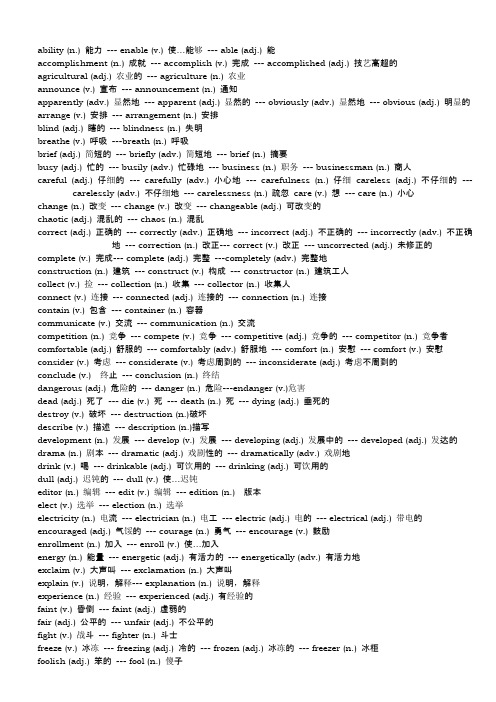
ability (n.) 能力--- enable (v.) 使…能够--- able (adj.) 能accomplishment (n.) 成就--- accomplish (v.) 完成--- accomplished (adj.) 技艺高超的agricultural (adj.) 农业的--- agriculture (n.) 农业announce (v.) 宣布--- announcement (n.) 通知apparently (adv.) 显然地--- apparent (adj.) 显然的--- obviously (adv.) 显然地--- obvious (adj.) 明显的arrange (v.) 安排--- arrangement (n.) 安排blind (adj.) 瞎的--- blindness (n.) 失明breathe (v.) 呼吸---breath (n.) 呼吸brief (adj.) 简短的--- briefly (adv.) 简短地--- brief (n.) 摘要busy (adj.) 忙的--- busily (adv.) 忙碌地--- business (n.) 职务--- businessman (n.) 商人careful (adj.) 仔细的--- carefully (adv.) 小心地--- carefulness (n.) 仔细careless (adj.) 不仔细的--- carelessly (adv.) 不仔细地--- carelessness (n.) 疏忽care (v.) 想--- care (n.) 小心change (n.) 改变--- change (v.) 改变--- changeable (adj.) 可改变的chaotic (adj.) 混乱的--- chaos (n.) 混乱correct (adj.) 正确的--- correctly (adv.) 正确地--- incorrect (adj.) 不正确的--- incorrectly (adv.) 不正确地--- correction (n.) 改正--- correct (v.) 改正--- uncorrected (adj.) 未修正的complete (v.) 完成--- complete (adj.) 完整---completely (adv.) 完整地construction (n.) 建筑--- construct (v.) 构成--- constructor (n.) 建筑工人collect (v.) 捡--- collection (n.) 收集--- collector (n.) 收集人connect (v.) 连接--- connected (adj.) 连接的--- connection (n.) 连接contain (v.) 包含--- container (n.) 容器communicate (v.) 交流--- communication (n.) 交流competition (n.) 竞争--- compete (v.) 竞争--- competitive (adj.) 竞争的--- competitor (n.) 竞争者comfortable (adj.) 舒服的--- comfortably (adv.) 舒服地--- comfort (n.) 安慰--- comfort (v.) 安慰consider (v.) 考虑--- considerate (v.) 考虑周到的--- inconsiderate (adj.) 考虑不周到的conclude (v.)终止--- conclusion (n.) 终结dangerous (adj.) 危险的--- danger (n.) 危险---endanger (v.)危害dead (adj.) 死了--- die (v.) 死--- death (n.) 死--- dying (adj.) 垂死的destroy (v.) 破坏--- destruction (n.)破坏describe (v.) 描述--- description (n.)描写development (n.) 发展--- develop (v.) 发展--- developing (adj.) 发展中的--- developed (adj.) 发达的drama (n.) 剧本--- dramatic (adj.) 戏剧性的--- dramatically (adv.) 戏剧地drink (v.) 喝--- drinkable (adj.) 可饮用的--- drinking (adj.) 可饮用的dull (adj.) 迟钝的--- dull (v.) 使…迟钝editor (n.) 编辑--- edit (v.) 编辑--- edition (n.)版本elect (v.) 选举--- election (n.) 选举electricity (n.) 电流--- electrician (n.) 电工--- electric (adj.) 电的--- electrical (adj.) 带电的encouraged (adj.) 气馁的--- courage (n.) 勇气--- encourage (v.) 鼓励enrollment (n.) 加入--- enroll (v.) 使…加入energy (n.) 能量--- energetic (adj.) 有活力的--- energetically (adv.) 有活力地exclaim (v.) 大声叫--- exclamation (n.) 大声叫explain (v.) 说明,解释--- explanation (n.) 说明,解释experience (n.) 经验--- experienced (adj.) 有经验的faint (v.) 昏倒--- faint (adj.) 虚弱的fair (adj.) 公平的--- unfair (adj.) 不公平的fight (v.) 战斗--- fighter (n.) 斗士freeze (v.) 冰冻--- freezing (adj.) 冷的--- frozen (adj.) 冰冻的--- freezer (n.) 冰柜foolish (adj.) 笨的--- fool (n.) 傻子grin (v.) 露齿而笑--- grin (n.) 露齿而笑harmful (adj.) 有害的--- harmless (adj.) 无害的--- harm (v.) 对…有害industrial (adj.) 工业的--- industry (n.) 工业impatient (adj.) 不耐烦的--- impatiently (adj.) 不耐烦地--- impatience (n.) 不耐烦patient (adj.) 有耐心的--- patiently (adv.) 有耐心地--- patience (n.) 耐心measure (v.) 测量--- measure (n.) 尺寸--- measurable (adj.) 可测的--- measurement (n.) 测定messy (adj.) 污秽的--- mess (n.) 混乱monthly (adj.) 每月的--- monthly (adv.) 每月一次地--- month (n.) 月份nature (n.) 自然--- natural (adj.) 自然的obey (v.) 服从--- disobey (v.) 不服从official (adj.) 正式的--- official (n.)官员--- officially (adv.) 正式地puzzled (adj.) 困惑的--- puzzling (adj.) 使…困惑的--- puzzle (v.) 使…困惑--- puzzle (n.) 拼图polite (adj.) 礼貌的--- politely (adv.) 有礼貌地--- impolite (adj.) 不礼貌的--- impolitely (adv.) 不礼貌地provide (v.) 提供--- produce (v.) 生产--- production (n.) 生产-- product (n.) 产品past (prep.) 通过--- pass (v.) 通过pollute (v.) 污染--- pollution (n.) 污染power (n.) 能量--- powerful (adj.) 强大的--- powerless (adj.) 无能力的principal (n.) 负责人--- principle (n.) 法则publish (v.) 出版--- publisher (n.) 出版人repeat (n.) 重复--- repetition (n.) 重复--- repeated (adj.) 重复的--- repeatedly (adv.) 重复地receive (v.) 收到--- reception (n.) 接见--- receptionist (n.) 招待员reply (n.) 答复--- reply (v.) 回答relax (v.) 放松--- relaxed (adj.) 放松的--- relaxing (adj.) 使… 迷惑--- relaxation (n.) 放松responsible (adj.) 负责的--- responsibility (adv.) 负责地--- responsibility (n.) 职责scenic (adj.) 风景的--- scenery (n.) 风景--- scene (n.) 景色sensible (adj.) 明智的--- sensibly (adv.) 明显地--- sensibility (n.) 感性--- sensitive (adj.) 敏感的safe (adj.) 安全的--- safety (adv.) 安全--- safely (n.) 安全的service (n.) 服务--- servant (n.) 仆人--- serve (v.) 服务salt (n.) 盐--- salty (adj.) 咸的scientific (adj.) 科学的--- science (n.) 科学--- scientist (n.) 科学家technical (adj.) 工艺的--- technician (n.) 技术人员treatment (n.) 处理--- treat (v.) 对待--- treat (n.) 款待thorough (adj.) 彻底的--- thoroughly (adv.) 彻底地trick (v.) 耍--- trick (n.) 恶作剧visible (adj.) 可见的--- invisible (adj.) 不可见的--- invisibly (adv.) 看不出地---vision (n.) 视力valuable (adj.) 有价值的--- value (n.) 价值--- value (v.) 定价warn (v.) 警告--- warning (n.) 警告。
英语词性转换的技巧
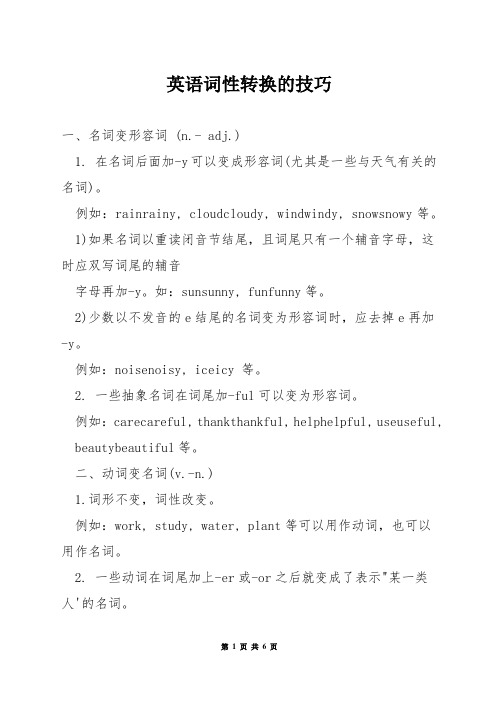
英语词性转换的技巧一、名词变形容词 (n.- adj.)1. 在名词后面加-y可以变成形容词(尤其是一些与天气有关的名词)。
例如:rainrainy, cloudcloudy, windwindy, snowsnowy等。
1)如果名词以重读闭音节结尾,且词尾只有一个辅音字母,这时应双写词尾的辅音字母再加-y。
如:sunsunny, funfunny等。
2)少数以不发音的e结尾的名词变为形容词时,应去掉e再加-y。
例如:noisenoisy, iceicy 等。
2. 一些抽象名词在词尾加-ful可以变为形容词。
例如:carecareful, thankthankful, helphelpful, useuseful, beautybeautiful等。
二、动词变名词(v.-n.)1.词形不变,词性改变。
例如:work, study, water, plant等可以用作动词,也可以用作名词。
2. 一些动词在词尾加上-er或-or之后就变成了表示"某一类人'的名词。
例如:workworker, teachteacher, singsinger, jumpjumper, playplayer,learnlearner, visitvisitor, inventinventor等。
2学好英语的小窍门学习英语是随时随地的比如说买了一件新东西我都会对上面的包装或说明书仔细研究一番,当然不是在研究商品本身,是为了看上面的英语解释,想多几个地道的英语表达而已。
买了一瓶止咳露,从上面也学到不少东西。
比如说,有效期可以说成validity,规格可以说成specification,贮藏可以说成 storage,放在儿童接触的地方可以这样说keep out of the reach of children,等等等等。
这些东西都非常有用,虽然有时你看了一遍不一定记得,但当你下次再碰到它们的时候你的印象就会更加深入,久而久之便会记得。
- 1、下载文档前请自行甄别文档内容的完整性,平台不提供额外的编辑、内容补充、找答案等附加服务。
- 2、"仅部分预览"的文档,不可在线预览部分如存在完整性等问题,可反馈申请退款(可完整预览的文档不适用该条件!)。
- 3、如文档侵犯您的权益,请联系客服反馈,我们会尽快为您处理(人工客服工作时间:9:00-18:30)。
英语单词词性转换的基本规律.动词(v.)→名词(n.)(a)词形不变,词性改变例如:work, study, water, plant等可以用作动词(工作,学习,浇水,种植),也可以用作名词(工作,学习,水,植物).(b)一些动词在词尾加上-er或-or之后就变成了表示"某一类人"的名词例如:work—worker, teach—teacher, sing—singer,jump—jumper, play—player, learn—learner,visit—visitor, invent—inventor,collect—collector等.注意:1)以不发音的e结尾的动词,在词尾加-r.例如:drive—driver, write—writer等.2)以重读闭音节结尾,且末尾只有一个辅音字母的动词,应双写末尾的辅音字母,再加-er例如:run—runner, win—winner,begin—beginner等.(c)在动词词尾加上-ment 变成名词例如:achieve—achievement (成就)advertise—advertisement//advertising(广告)agree—agreement disgree—disagreementamuse—amusement (娱乐) improve—improvement(争吵)commit(奉献)—commitment develop—development (发展)depart—department (局,部) govern(统治)—government(政府)manage—management (管理) equip—equipment (装备)有些单词比较特殊,需把动词后的e去掉再加ment.例如:argue—argument(争论)(d)在动词词尾加上-(t)ion/(s)ion变成名词例如: attract—attraction; instruct—instruction;invent—invention discuss—discussion;express—expression educate—education;graduate—graduation; operate—operation (去e再加"ion")compete—competition; organize—organization (把e改成其他字母再加"tion")decide—decision conclude—conclusion (把de改为s再加"ion")describe—description描写,描绘 (这是特例,不规则变化)(e)在动词词尾加上-ance变成名词例如: appear—appearance (外貌;出现)perform—performance (演出)accept—acceptance (接受)(f)在动词词尾加-ing变成名词 (方法与动词变为现在分词的方法相同)例如:meet—meeting build—building wait—waitingbathe—bathing say—saying(谚语) mean—meaningend —ending train —training wash—washing注意:以重读闭音节结尾,且末尾只有一个辅音字母的动词,应双写末尾的辅音字母,再加-ing如:swim—swimming shop—shopping begin—beginning(g)其他一些比较特殊的变化例如: Beg(乞讨)—beggar(乞丐) behave(行为举止)—behaviorknow(知道)—knowledge(知识) fly—flight (飞行)heat (加热)—heat(热量) hit (撞击)—hit( 轰动一时的人或物,碰撞)mix (混合)—mixture(混合物) press(按,压)—pressure(压力)sit(坐)—seat (座位) succeed—success(成功)tour—tour(旅游)/ tourist (游客)2.动词(v.)→形容词(adj.)(a)动词后面加able,以e结尾的动词则去e加able,表示具有此性质,特点或属性.例如: afford-affordable;love-lovable(b)动词后面加ed,以e结尾的动词则直接加d,表示被动性的属性或特点.例如: scatter-scattered use-used(c)不规则的动词则必须记忆,记住其过去分词形式.规律不大,意义同(b).3.名词(n.)→形容词(adj.)(a)在名词后面加-y可以变成形容词(尤其是一些与天气有关的名词)例如: rain—rainy, cloud—cloudy, wind—windy, snow—snowy,health—healthy, luck—lucky,anger—angry guilt—guilty(内疚的)tourist—touristy(游客多的) , salt (盐)—salty (咸的)silk(丝绸)—silky(丝绸般的), sleep—sleepy (昏昏欲睡的)注意:1)如果以重读闭音节结尾,且词尾只有一个辅音字母,这时应双写辅音字母再加"-y".如: sun—sunny, fun—funny, fog—foggy(有雾的), fur—furry(毛皮的)2)少数以不发音的e结尾的名词变为形容词时,应去掉e再加"-y".如: noise—noisy, ice—icy, shine—shiny(发亮的), taste(口味)—tasty(甜的)(b)名词后面加-ed,以e结尾的直接加d.例如: spot(斑点)—spotted(有斑点的); talent—talented (有天赋的)organize—organized 有组织的; balance—balanced(平衡的)(c)一些抽象名词在词尾加-ful可以变为形容词例如:care—careful, thank—thankful, help—helpful,use—useful, meaning—meaningful(d)在名词后加-less构成含有否定意义的形容词例如:care—careless(粗心的), use—useless(无用的)hope—hopeless(没希望的),home—homeless(无家可归的)(e)一些以-ce结尾的名词,把-ce改为-t变成形容词例如: difference—different, silence—silent, confidence—confident(f).在名词后加-ly变为形容词例如: friend—friendly, love—lovely, live---lively(g).在名词后加-ous变为形容词例如: danger—dangerous(h)名词后面加-al变为形容词例如: music—musical; medicine—medical (这个比较特殊)(i)名词后面加-able变为形容词,如果以e结尾就去e再加"-able".例如: adjust—adjustable 可调整的 value—valuable有价值的(j)名词后面加-en变成形容词例如: wood—wooden 木制的 wool—woolen 羊毛的(k)一些表示国家的名词可以在词尾加-ese, -ish或-n构成表示国籍,语言的形容词例如:China—Chinese, Japan—Japanese, England—English,America—American, India—Indian, Australia —Australian(注意Canada—Canadian)4..形容词(adj.)→副词(adv.)▲一般在形容词的词尾加-ly可以变成副词例如: quick—quickly, slow—slowly, loud—loudly, sudden—suddenly 等但是,以下几点值得注意:(a) 一些以"辅音字母+y"结尾的形容词,要把y改为i再加-ly例如: happy—happily, angry—angrily, lucky—luckily, heavy—heavily, noisy—noisily(b) 有些以-ble或-le结尾的形容词,去掉e加-y例如:possible—possibly, terrible—terribly(c)少数以e结尾的形容词,要去掉e再加-ly例如: true—truly但绝大多数以e结尾的形容词仍然直接加-ly 例如: polite—politely, wide—widely(d)以-l结尾的形容词变为副词时要在词尾加-ly,以-ll结尾的才在词尾只加-y.例如: usual—usually, careful—carefully, useful—usefullyfull—fully (以-ll结尾的才只加y)OK,以上就是英语单词词性变化的一般规律,希望对大家有所帮助PS:有些同学可能对元音辅音以及重读闭音节不是很了解,那我在这里再做下补充说明.1.英语26个字母中,a e i o u是元音字母, y是半元音字母, 其余都是辅音字母.★所谓半元音就是有时候做元音,有时候做辅音.半元音字母y做元音有: shy,sky做辅音比如最简单的:yes2.开音节和闭音节开音节分两种:绝对开音节和相对开音节绝对开音节指的是"元音字母结尾"的音节 (例如 we, hi等)相对开音节是指"辅音字母-元音字母-辅音字母-不发音的e"的音节,(r除外). ( 例如,take,make等)比如:take (在这个单词中,t是辅音,a是元音,k是辅音,e是不发音的元音)◆在开音节中, 元音字母发他们在字母表中的音闭音节, 则是指"辅音字母-元音字母-辅音字母"的音节 ( -al等除外) (例如:leg,cross等)◆在闭音节中,元音字母发不同的音a e i o u例 sat let sit not nut (试着读下这些单词,这些单词中,元音发的音都不是它们在字母表中发的音)2.英语重读闭音节就是以辅音因素结尾的,而且是重读音节的音节.比如apple 划音节就因该是ap/ple 前面那个ap是一个音节,这个音节以辅音因素p结尾,所以就是闭音节.(仅仅能看出是闭音节,是不是重读闭音节还要看这个音节是不是重读的)重读闭音节三要素:1. 必须是重读音节;2. 最后只有一个辅音字母;3.元音字母发短元音 ( 说通俗点,打个比方, /u/是短元音,/u:/是长元音)重读闭音节即两个辅音中间夹一个元音.如:sit---sitting begin---beginning(重读在gin这个音节上)●像travel这个单词,"vel"也是"辅音+元音+辅音"的结构,但是重音不在vel这个音节上,所以不用双写"l",可以为travelled,也可以是traveled,更常用的是后者.英语单词词根词缀和词性转换英语中常见的后缀一、名词性后缀1,-age为抽象名词后缀,表示行为,状态和全体总称percentage百分数,百分率,voltage电压,伏特数,lavage灌洗,洗,出法,gavage管词法,curettage刮除法,shortage 不足,缺少。
